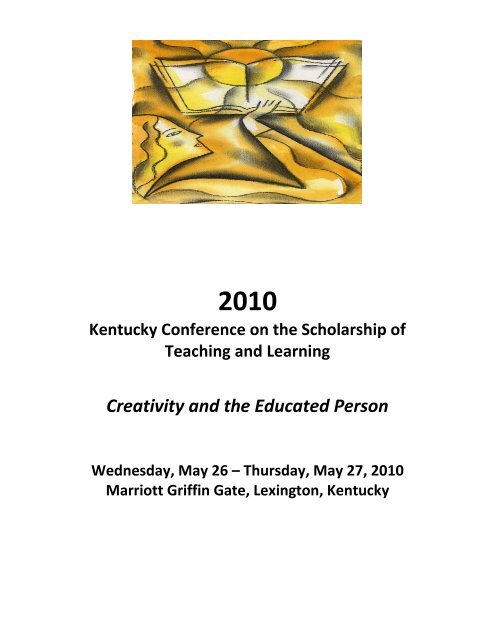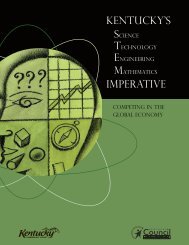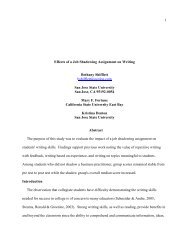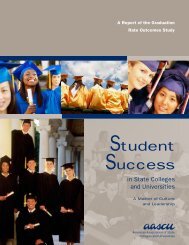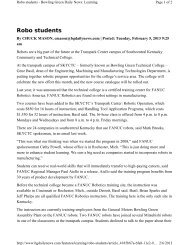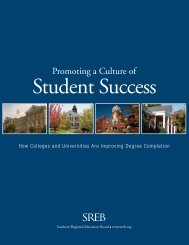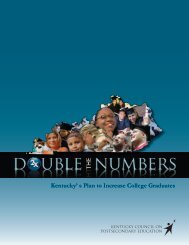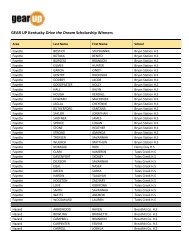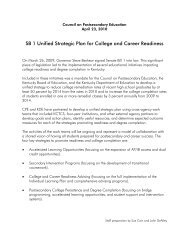Creativity and the Educated Person - Council on Postsecondary ...
Creativity and the Educated Person - Council on Postsecondary ...
Creativity and the Educated Person - Council on Postsecondary ...
- No tags were found...
You also want an ePaper? Increase the reach of your titles
YUMPU automatically turns print PDFs into web optimized ePapers that Google loves.
2010Kentucky C<strong>on</strong>ference <strong>on</strong> <str<strong>on</strong>g>the</str<strong>on</strong>g> Scholarship ofTeaching <str<strong>on</strong>g>and</str<strong>on</strong>g> Learning<str<strong>on</strong>g>Creativity</str<strong>on</strong>g> <str<strong>on</strong>g>and</str<strong>on</strong>g> <str<strong>on</strong>g>the</str<strong>on</strong>g> <str<strong>on</strong>g>Educated</str<strong>on</strong>g> <str<strong>on</strong>g>Pers<strong>on</strong></str<strong>on</strong>g>Wednesday, May 26 – Thursday, May 27, 2010Marriott Griffin Gate, Lexingt<strong>on</strong>, Kentucky
2010Kentucky C<strong>on</strong>ference <strong>on</strong> <str<strong>on</strong>g>the</str<strong>on</strong>g> Scholarship of Teaching <str<strong>on</strong>g>and</str<strong>on</strong>g> Learning<str<strong>on</strong>g>Creativity</str<strong>on</strong>g> <str<strong>on</strong>g>and</str<strong>on</strong>g> <str<strong>on</strong>g>the</str<strong>on</strong>g> <str<strong>on</strong>g>Educated</str<strong>on</strong>g> <str<strong>on</strong>g>Pers<strong>on</strong></str<strong>on</strong>g>Wednesday, May 26, 2010Wednesday, May 26 – Thursday, May 27, 2010Marriott Griffin Gate, Lexingt<strong>on</strong>, Kentucky10:00 AM C<strong>on</strong>ference Registrati<strong>on</strong>No<strong>on</strong>Opening Sessi<strong>on</strong>/Lunche<strong>on</strong> (Sal<strong>on</strong> C/D/E)Welcome, Robert King, President, CPEKYVL Scholars Recogniti<strong>on</strong>“Teaching <str<strong>on</strong>g>the</str<strong>on</strong>g> 21st Century Student”, Aar<strong>on</strong> Thomps<strong>on</strong>, Ph.D.1:45 PM– 5:20 PM C<strong>on</strong>current Sessi<strong>on</strong>s5:30 PM Recepti<strong>on</strong>/Poster Sessi<strong>on</strong>s, Bluegrass Pavili<strong>on</strong>6:30 PM Dinner (Sal<strong>on</strong> C/D/E)“<str<strong>on</strong>g>Creativity</str<strong>on</strong>g> R Us”, Hal Bly<str<strong>on</strong>g>the</str<strong>on</strong>g> & Charlie SweetThursday, May 27, 20107:30 AM – 8:30 AM Buffet Breakfast, Bluegrass Pavili<strong>on</strong>8:30 AM – 12:30 PM C<strong>on</strong>current Sessi<strong>on</strong>s12:30 PM C<strong>on</strong>ference C<strong>on</strong>cludes
2010 Kentucky C<strong>on</strong>ference<strong>on</strong> <str<strong>on</strong>g>the</str<strong>on</strong>g> Scholarship of Teaching <str<strong>on</strong>g>and</str<strong>on</strong>g> LearningFACULTY DEVELOPMENT WORKGROUP 2010 MEMBERSJ. Patrick Moynihan, Faculty Development WorkgroupChairNor<str<strong>on</strong>g>the</str<strong>on</strong>g>rn Kentucky UniversityEric JerdeMorehead State UniversityHal Bly<str<strong>on</strong>g>the</str<strong>on</strong>g>*Eastern Kentucky UniversityWilliam BurkeUniversity of KentuckyCarolyn CarterKentucky Community <str<strong>on</strong>g>and</str<strong>on</strong>g> Technical College SystemGale Rhodes*University of LouisvilleSally KuhlenschmidtWestern Kentucky UniversityLinda Linville*Kentucky <str<strong>on</strong>g>Council</str<strong>on</strong>g> <strong>on</strong> Postsec<strong>on</strong>dary Educati<strong>on</strong>Samuel C<strong>on</strong>nKentucky State UniversitySusan Weaver*University of <str<strong>on</strong>g>the</str<strong>on</strong>g> Cumberl<str<strong>on</strong>g>and</str<strong>on</strong>g>sAssociati<strong>on</strong> of Independent Kentucky Colleges<str<strong>on</strong>g>and</str<strong>on</strong>g> UniversitiesEnid WohlsteinKentucky Virtual LibraryKentucky <str<strong>on</strong>g>Council</str<strong>on</strong>g> <strong>on</strong> Postsec<strong>on</strong>dary Educati<strong>on</strong>Hal RiceMurray State UniversityPaul Wirtz*Nor<str<strong>on</strong>g>the</str<strong>on</strong>g>rn Kentucky UniversityKentucky Associati<strong>on</strong> for Colleges of TeacherEducati<strong>on</strong>*C<strong>on</strong>ference Planning Committee memberCharlie Sweet*Eastern Kentucky UniversityKentucky <str<strong>on</strong>g>Council</str<strong>on</strong>g> <strong>on</strong> Postsec<strong>on</strong>dary Educati<strong>on</strong>
Wednesday, 5/26/201001:45pmC<strong>on</strong>ference ProgramCalumet – General Educati<strong>on</strong>; TechnologyTest Presentati<strong>on</strong> Modes, Student Self-perceived Learning Preferences, <str<strong>on</strong>g>and</str<strong>on</strong>g> Student Performance <strong>on</strong>C<strong>on</strong>ceptual <str<strong>on</strong>g>and</str<strong>on</strong>g> Applied ProblemsThis sessi<strong>on</strong> addresses <str<strong>on</strong>g>the</str<strong>on</strong>g> assessment issue in a technology-rich formal educati<strong>on</strong> setting. Using data collectedin two web-enhanced secti<strong>on</strong>s of an undergraduate core educati<strong>on</strong> course in spring 2008 <str<strong>on</strong>g>and</str<strong>on</strong>g> fall 2008, thissessi<strong>on</strong> is to present <str<strong>on</strong>g>the</str<strong>on</strong>g> impact of test presentati<strong>on</strong> modes (i.e., all at <strong>on</strong>ce, <strong>on</strong>e at a time, <str<strong>on</strong>g>and</str<strong>on</strong>g> <strong>on</strong>e at a time – nobacktracking), coupled with student self-perceived ways of learning, <strong>on</strong> student achievement in two major types oftest problems (i.e., c<strong>on</strong>ceptual, applied). This sessi<strong>on</strong> will provide insight as to how <str<strong>on</strong>g>the</str<strong>on</strong>g> evolving technology in educati<strong>on</strong>affects student test performance.Presenter: Yuejin Xu, Murray State University,Wednesday, 5/26/201001:45pmDarby DanBalancing Service-Learning with Research, Teaching <str<strong>on</strong>g>and</str<strong>on</strong>g> Service Expectati<strong>on</strong>sService-learning is a pedagogy that can be used across <str<strong>on</strong>g>the</str<strong>on</strong>g> curriculum, throughout <strong>on</strong>e‟s teaching career,<str<strong>on</strong>g>and</str<strong>on</strong>g> at various types of instituti<strong>on</strong>s. Each situati<strong>on</strong> is unique <str<strong>on</strong>g>and</str<strong>on</strong>g> different challenges must be addressed when designingcurriculum, balancing time c<strong>on</strong>straints, <str<strong>on</strong>g>and</str<strong>on</strong>g> preparing professi<strong>on</strong>al portfolios for career advancement. Thispanel will include a representative from Kentucky Campus Compact, <str<strong>on</strong>g>and</str<strong>on</strong>g> faculty from various types of instituti<strong>on</strong>s<str<strong>on</strong>g>and</str<strong>on</strong>g> career stages. The challenges of balancing service-learning with instituti<strong>on</strong>al expectati<strong>on</strong>s regarding research,teaching, <str<strong>on</strong>g>and</str<strong>on</strong>g> service will be explored. Panelist <str<strong>on</strong>g>and</str<strong>on</strong>g> participants will discuss issues relating to each career stage fromgraduate student to full professor.Presenters: Janet McCoy, Morehead State University, Gayle Hilleke, Kentucky Campus Compact, R<str<strong>on</strong>g>and</str<strong>on</strong>g>yManis, Jeffrey Zutaut, & Faith Dement, Morehead State University, Joyce Carmouche,Abbey Poffenberger, & Myra Beth Bundy, Eastern Kentucky University, Kelly Rogers, Gina Winchester, &Emma Perkins, Morehead State UniversityWednesday, 5/26/201001:45pmDixianaDo Pre/Post Test Results Tell Teachers Enough About Their Students?This sessi<strong>on</strong> will focus <strong>on</strong> interpreting pre/post test data to identify trends that show how <str<strong>on</strong>g>and</str<strong>on</strong>g> what studentslearn. Knowing students‟ learning styles, IEPs, <str<strong>on</strong>g>and</str<strong>on</strong>g> o<str<strong>on</strong>g>the</str<strong>on</strong>g>r demographics provide useful informati<strong>on</strong> that helps determinefuture instructi<strong>on</strong>al strategies, classroom activities, etc. The overall purpose of <str<strong>on</strong>g>the</str<strong>on</strong>g> sessi<strong>on</strong> is to show that <strong>on</strong>lynumerical scores <strong>on</strong> pre/post tests do not always provide <str<strong>on</strong>g>the</str<strong>on</strong>g> best informati<strong>on</strong>.Presenter: Janette Ralst<strong>on</strong>, Lindsey Wils<strong>on</strong> CollegeKentucky <str<strong>on</strong>g>Council</str<strong>on</strong>g> <strong>on</strong> Postsec<strong>on</strong>dary Educati<strong>on</strong>
Wednesday, 5/26/201001:45pmLanes EndShred Those Worksheets! Make Learning Come Alive!The days of assigning worksheets are over! C<str<strong>on</strong>g>and</str<strong>on</strong>g>idates in K-12 educati<strong>on</strong> programs need to learn howto bring <str<strong>on</strong>g>the</str<strong>on</strong>g> WOW into <str<strong>on</strong>g>the</str<strong>on</strong>g>ir classrooms. This sessi<strong>on</strong> will include creative, innovative strategies involving technology,classroom management, simulati<strong>on</strong>s, <str<strong>on</strong>g>and</str<strong>on</strong>g> investigati<strong>on</strong>s that can be used in several c<strong>on</strong>tent areas. Fun<str<strong>on</strong>g>and</str<strong>on</strong>g> meaningful applicati<strong>on</strong>s for inquiry-based learning will be presented in an interdisciplinary c<strong>on</strong>structivistformat. Also, creative formative <str<strong>on</strong>g>and</str<strong>on</strong>g> summative assessments that will lead to improved student achievementwill be modeled.Presenters: Peggy McGuire, C<strong>on</strong>nie Hodge, & Peggy Petrilli, Eastern Kentucky University -CorbinWednesday, 5/26/201001:45pmSal<strong>on</strong> A/BInquire Within: Living <strong>on</strong> <str<strong>on</strong>g>the</str<strong>on</strong>g> Right Side of <str<strong>on</strong>g>the</str<strong>on</strong>g> BrainIt has always been important for students to be technically prepared <str<strong>on</strong>g>and</str<strong>on</strong>g> professi<strong>on</strong>ally competent.However, coming into <str<strong>on</strong>g>the</str<strong>on</strong>g> 21st century, it is even more important for <str<strong>on</strong>g>the</str<strong>on</strong>g>m to be creatively prepared, to be ableto go bey<strong>on</strong>d <str<strong>on</strong>g>the</str<strong>on</strong>g> ideas of <str<strong>on</strong>g>the</str<strong>on</strong>g> present, to deal with <str<strong>on</strong>g>the</str<strong>on</strong>g> complex set of issues facing this century.The future bel<strong>on</strong>gs to a very different kind of pers<strong>on</strong> with a very different kind of mind. We are now a part of anew world in which "right brain" qualities are essential. An effort must be made to introduce this type of thinkingto students.Presenter: Ryan Hargrove, University of KentuckyWednesday, 5/26/201001:45pmSal<strong>on</strong> G/HTeaching Students of Appalachian CultureThis presentati<strong>on</strong> will attempt to highlight pedagogical methods <str<strong>on</strong>g>and</str<strong>on</strong>g> interventi<strong>on</strong>s that work well withstudents of Appalachian culture. Though <str<strong>on</strong>g>the</str<strong>on</strong>g>re is great diversity in Appalachia, generalizati<strong>on</strong>s will be used thatbroadly address cultural values found by research to impact educati<strong>on</strong> for this populati<strong>on</strong>. Cultural traits to beaddressed include str<strong>on</strong>g family/community ties, loyalty to place, distrust of outsiders, social egalitarianism,collectivist but independent socializati<strong>on</strong>, patriarchal gender set, indirect communicati<strong>on</strong>, effects of bias, <str<strong>on</strong>g>and</str<strong>on</strong>g>preference for blue collar careers. Am<strong>on</strong>g suggesti<strong>on</strong>s for working with <str<strong>on</strong>g>the</str<strong>on</strong>g>se students are communicati<strong>on</strong> stylechanges, problem-based learning, <str<strong>on</strong>g>and</str<strong>on</strong>g> encouraging local educati<strong>on</strong>.Presenters: Kathryn Russ & Jennifer Williams<strong>on</strong>, Lindsey Wils<strong>on</strong> CollegeWednesday, 5/26/201001:45pmSax<strong>on</strong>yInvolving <str<strong>on</strong>g>the</str<strong>on</strong>g> Campus <str<strong>on</strong>g>and</str<strong>on</strong>g> <str<strong>on</strong>g>the</str<strong>on</strong>g> Community to Create Revelent Classroom LearningStudent learning is maximized when <str<strong>on</strong>g>the</str<strong>on</strong>g>y are fully engaged in <str<strong>on</strong>g>the</str<strong>on</strong>g> process of producing dem<strong>on</strong>strableoutcomes. Student motivati<strong>on</strong> for learning is increased when that outcome will be subjected to public scrutiny<str<strong>on</strong>g>and</str<strong>on</strong>g> is aggregated in to a larger product. Courses which incorporate student work into a peer <str<strong>on</strong>g>and</str<strong>on</strong>g> communityreviewed outcome create a relevant, engaging learning experience, as well as a multi-faceted assessment processinvovling student peers, campus-wide staff <str<strong>on</strong>g>and</str<strong>on</strong>g> faculty, <str<strong>on</strong>g>and</str<strong>on</strong>g> <str<strong>on</strong>g>the</str<strong>on</strong>g> off campus community.Presenter: David D<strong>on</strong>athan, St. Catharine CollegeKentucky <str<strong>on</strong>g>Council</str<strong>on</strong>g> <strong>on</strong> Postsec<strong>on</strong>dary Educati<strong>on</strong>
Wednesday, 5/26/201001:45pmTerrace BallroomThe 7 Habits of Highly Ineffective TeachersThe rules for successful teaching have changed due <str<strong>on</strong>g>the</str<strong>on</strong>g> impact of technology <str<strong>on</strong>g>and</str<strong>on</strong>g> <str<strong>on</strong>g>the</str<strong>on</strong>g> skills expectedof graduates as <str<strong>on</strong>g>the</str<strong>on</strong>g>y enter <str<strong>on</strong>g>the</str<strong>on</strong>g> workforce in <str<strong>on</strong>g>the</str<strong>on</strong>g> informati<strong>on</strong> age. Whereas Steven Covey‟s "7 Habits forHighly Effective People" identified effectual characteristics to be admired, this sessi<strong>on</strong> will highlight comm<strong>on</strong>pitfalls that so easily entangle well-meaning faculty. Even perfect p<strong>on</strong>tificators are invited to attend, if<strong>on</strong>ly to pass <strong>on</strong> <str<strong>on</strong>g>the</str<strong>on</strong>g> insights to your helpless colleagues when you get home. (You know who <str<strong>on</strong>g>the</str<strong>on</strong>g>y are!) Comerelax <str<strong>on</strong>g>and</str<strong>on</strong>g> enjoy this insightful <str<strong>on</strong>g>and</str<strong>on</strong>g> light-hearted presentati<strong>on</strong> as we look at successful teaching from <str<strong>on</strong>g>the</str<strong>on</strong>g> reverseside.Presenter: Thad Crews, Western Kentucky UniversityWednesday, 5/26/201002:45pmCalumetReady (or not) for CollegeThis sessi<strong>on</strong> examines how pre-service teachers in a foundati<strong>on</strong>s course at Eastern Kentucky Universityare introduced to <str<strong>on</strong>g>the</str<strong>on</strong>g> importance <str<strong>on</strong>g>and</str<strong>on</strong>g> use of curriculum st<str<strong>on</strong>g>and</str<strong>on</strong>g>ards through a pers<strong>on</strong>al examinati<strong>on</strong> of <str<strong>on</strong>g>the</str<strong>on</strong>g>irown high school experience.An integrated approach combines a survey of students‟ percepti<strong>on</strong>s of <str<strong>on</strong>g>the</str<strong>on</strong>g>ir own educati<strong>on</strong>al experience, apers<strong>on</strong>al reflecti<strong>on</strong> <str<strong>on</strong>g>and</str<strong>on</strong>g> an explorati<strong>on</strong> of Kentucky‟s Learning Goals <str<strong>on</strong>g>and</str<strong>on</strong>g> Academic Expectati<strong>on</strong>s, to promotecritical thinking <str<strong>on</strong>g>and</str<strong>on</strong>g> answer <str<strong>on</strong>g>the</str<strong>on</strong>g> questi<strong>on</strong>: “How well did my high school <str<strong>on</strong>g>and</str<strong>on</strong>g> I prepare me for college?”Participants will use Turning Point “clickers” to predict typical student resp<strong>on</strong>ses over three semesters ofdata.Presenters: Richard Day & Jeannette Lovern, Eastern Kentucky UniversityWednesday, 5/26/201002:45pmDarby DanAltering a Learner Populati<strong>on</strong>’s Trajectory Using Student Epistemic Belief DataThis Student Success Track paper <str<strong>on</strong>g>and</str<strong>on</strong>g> presentati<strong>on</strong> involves use of student epistemic belief data incurricula design <str<strong>on</strong>g>and</str<strong>on</strong>g> pedagogy to improve student academic success. Participants interact with <str<strong>on</strong>g>the</str<strong>on</strong>g> topic, fellowparticipants, <str<strong>on</strong>g>and</str<strong>on</strong>g> presenter via small group discussi<strong>on</strong> <str<strong>on</strong>g>and</str<strong>on</strong>g> apply a methodology using sample studentepistemic belief data <str<strong>on</strong>g>and</str<strong>on</strong>g> instructi<strong>on</strong>al design rubric for a domain specific course. Participants will benefitfrom: student epistemic belief data <str<strong>on</strong>g>and</str<strong>on</strong>g> its role in curricula design, relati<strong>on</strong>ships between epistemic beliefs<str<strong>on</strong>g>and</str<strong>on</strong>g> student success, <str<strong>on</strong>g>and</str<strong>on</strong>g> a methodology for improving student academic success via research-based instructi<strong>on</strong>aldesign. The intended audience includes K-12, adult, <str<strong>on</strong>g>and</str<strong>on</strong>g> post-sec<strong>on</strong>dary educators.Presenter: Samuel C<strong>on</strong>n, Kentucky State UniversityKentucky <str<strong>on</strong>g>Council</str<strong>on</strong>g> <strong>on</strong> Postsec<strong>on</strong>dary Educati<strong>on</strong>
Wednesday, 5/26/201002:45pmDixianaIssues <str<strong>on</strong>g>and</str<strong>on</strong>g> Insights into <str<strong>on</strong>g>the</str<strong>on</strong>g> Collaborative Grant Process: Partnering with community coaliti<strong>on</strong>s.This sessi<strong>on</strong> will describe <str<strong>on</strong>g>the</str<strong>on</strong>g> process of developing a collaborative community health grant from <str<strong>on</strong>g>the</str<strong>on</strong>g>early stages of coaliti<strong>on</strong> building <str<strong>on</strong>g>and</str<strong>on</strong>g> needs assessments, through <str<strong>on</strong>g>the</str<strong>on</strong>g> middle stage of c<strong>on</strong>sensus building, <str<strong>on</strong>g>and</str<strong>on</strong>g> <str<strong>on</strong>g>the</str<strong>on</strong>g>final stage of decisi<strong>on</strong>-making <str<strong>on</strong>g>and</str<strong>on</strong>g> submissi<strong>on</strong> of <str<strong>on</strong>g>the</str<strong>on</strong>g> proposal. The focus is <strong>on</strong> <str<strong>on</strong>g>the</str<strong>on</strong>g> efforts of <strong>on</strong>e rural communitycoaliti<strong>on</strong> to take advantage of <str<strong>on</strong>g>the</str<strong>on</strong>g> expertise of multiple c<strong>on</strong>stituents in creating a viable grant proposal. One importantissue that will be addressed is how to pull in experts in an area, without alienating <str<strong>on</strong>g>the</str<strong>on</strong>g> local community coaliti<strong>on</strong>swho know <str<strong>on</strong>g>the</str<strong>on</strong>g> needs of <str<strong>on</strong>g>the</str<strong>on</strong>g>ir own communities best.Presenters: Jody Giles & Melody Nall, Murray State UniversityWednesday, 5/26/201002:45pmLanes EndIncreasing Active Engagement through Graphic Organizers <str<strong>on</strong>g>and</str<strong>on</strong>g> Strategic Note-takingAs a participant in an Improving Educator Quality (IEQ) grant project with Nor<str<strong>on</strong>g>the</str<strong>on</strong>g>rn Kentucky University,a high school science teacher focused an acti<strong>on</strong> research project <strong>on</strong> increasing student engagement by implementingspecific approaches to note-taking to preview new c<strong>on</strong>tent <str<strong>on</strong>g>and</str<strong>on</strong>g> a variety of graphic organizers to reinforcelearning. In this sessi<strong>on</strong>, presenters will share <str<strong>on</strong>g>the</str<strong>on</strong>g>se strategies, <str<strong>on</strong>g>and</str<strong>on</strong>g> participants will evaluate <str<strong>on</strong>g>and</str<strong>on</strong>g> discuss which of<str<strong>on</strong>g>the</str<strong>on</strong>g>se strategies would be useful in promoting <str<strong>on</strong>g>the</str<strong>on</strong>g>ir own students‟ engagement <str<strong>on</strong>g>and</str<strong>on</strong>g> quality of learning, <str<strong>on</strong>g>and</str<strong>on</strong>g> discuss<str<strong>on</strong>g>the</str<strong>on</strong>g> comm<strong>on</strong> characteristics of effective study aids.Presenters: Lenore Kinne, Nor<str<strong>on</strong>g>the</str<strong>on</strong>g>rn Kentucky University, & Doug Kropp, Holmes High SchoolWednesday, 5/26/201002:45pmSal<strong>on</strong> A/BPromoting Student Engagement at <str<strong>on</strong>g>the</str<strong>on</strong>g> Postsec<strong>on</strong>dary Level Using TechnologyThis sessi<strong>on</strong> provides an overview of technology used to promote student engagement at <str<strong>on</strong>g>the</str<strong>on</strong>g> undergraduatelevel. The instructor used blogs, wikis, <str<strong>on</strong>g>and</str<strong>on</strong>g> interactive modules to increase student reflecti<strong>on</strong> <str<strong>on</strong>g>and</str<strong>on</strong>g> performancein <str<strong>on</strong>g>the</str<strong>on</strong>g> practicum setting. Results from instructor observati<strong>on</strong>s, student performance <strong>on</strong> assignments, <str<strong>on</strong>g>and</str<strong>on</strong>g> courseevaluati<strong>on</strong> instruments will be shared.Presenter: Kristina Krampe, Eastern Kentucky UniversityWednesday, 5/26/201002:45pmSal<strong>on</strong> G/HIncorporating Inquiry Strategies in Science ClassroomsThree vignettes of experienced science teachers‟ acti<strong>on</strong> research projects <str<strong>on</strong>g>and</str<strong>on</strong>g> an encompassing professi<strong>on</strong>aldevelopment experience illustrate how inquiry strategies can be incorporated into science instructi<strong>on</strong>. A descripti<strong>on</strong>of <str<strong>on</strong>g>the</str<strong>on</strong>g> professi<strong>on</strong>al development experience highlights how educati<strong>on</strong> researchers can help practicingteachers underst<str<strong>on</strong>g>and</str<strong>on</strong>g> inquiry instructi<strong>on</strong> <str<strong>on</strong>g>and</str<strong>on</strong>g> encourage inclusi<strong>on</strong> of inquiry methods in <str<strong>on</strong>g>the</str<strong>on</strong>g>ir classrooms. Three scienceteachers report <strong>on</strong> <str<strong>on</strong>g>the</str<strong>on</strong>g> implementati<strong>on</strong> <str<strong>on</strong>g>and</str<strong>on</strong>g> outcomes of <str<strong>on</strong>g>the</str<strong>on</strong>g>ir efforts to change <str<strong>on</strong>g>the</str<strong>on</strong>g>ir practice. Results from thisproject can be used as examples for o<str<strong>on</strong>g>the</str<strong>on</strong>g>rs to include more inquiry methods in <str<strong>on</strong>g>the</str<strong>on</strong>g>ir instructi<strong>on</strong>.Presenters: Steven Kerlin, Nor<str<strong>on</strong>g>the</str<strong>on</strong>g>rn Kentucky University, Chris Lorentz, Thomas More College, DeborahHaggard, Andrea C<strong>on</strong>ley, <str<strong>on</strong>g>and</str<strong>on</strong>g> Lori Graham, IEQKentucky <str<strong>on</strong>g>Council</str<strong>on</strong>g> <strong>on</strong> Postsec<strong>on</strong>dary Educati<strong>on</strong>
Wednesday, 5/26/201002:45pmSax<strong>on</strong>yThe University of Louisville's Resp<strong>on</strong>se to New Comm<strong>on</strong> Core St<str<strong>on</strong>g>and</str<strong>on</strong>g>ardsThis panel discussi<strong>on</strong> will feature leadership from <str<strong>on</strong>g>the</str<strong>on</strong>g> University of Louisville <str<strong>on</strong>g>and</str<strong>on</strong>g> <str<strong>on</strong>g>the</str<strong>on</strong>g> College of Educati<strong>on</strong><str<strong>on</strong>g>and</str<strong>on</strong>g> Human Development <str<strong>on</strong>g>and</str<strong>on</strong>g> will focus <strong>on</strong> <str<strong>on</strong>g>the</str<strong>on</strong>g> University‟s efforts to provide professi<strong>on</strong>al development tofaculty members about <str<strong>on</strong>g>the</str<strong>on</strong>g> new comm<strong>on</strong> core st<str<strong>on</strong>g>and</str<strong>on</strong>g>ards <str<strong>on</strong>g>and</str<strong>on</strong>g> to ensure <str<strong>on</strong>g>the</str<strong>on</strong>g> integrati<strong>on</strong> of <str<strong>on</strong>g>the</str<strong>on</strong>g> st<str<strong>on</strong>g>and</str<strong>on</strong>g>ards into <str<strong>on</strong>g>the</str<strong>on</strong>g>entire preparati<strong>on</strong> program. Members of <str<strong>on</strong>g>the</str<strong>on</strong>g> panel will share an update of <str<strong>on</strong>g>the</str<strong>on</strong>g> st<str<strong>on</strong>g>and</str<strong>on</strong>g>ards process <str<strong>on</strong>g>and</str<strong>on</strong>g> report <strong>on</strong> <str<strong>on</strong>g>the</str<strong>on</strong>g>status of U of L‟s efforts to address <str<strong>on</strong>g>the</str<strong>on</strong>g> provisi<strong>on</strong>s of Senate Bill 1.Presenters: Starr Lewis, Shirley Willihnganz, Blake Haselt<strong>on</strong>, Bill Bush, Kevin Nol<str<strong>on</strong>g>and</str<strong>on</strong>g>, & Ann Lars<strong>on</strong>,University of Louisville, & Carolyn Whit J<strong>on</strong>es, New Cities InstituteWednesday, 5/26/201002:45pmTerrace BallroomSerious Games <str<strong>on</strong>g>and</str<strong>on</strong>g> Deep Learning: Is it Possible?Have you watched video game players, wishing that level of persistence <str<strong>on</strong>g>and</str<strong>on</strong>g> enjoyment was directed toyour discipline? What can teachers learn from games? How does technology make it possible to infuse gamesmore easily <str<strong>on</strong>g>and</str<strong>on</strong>g> c<strong>on</strong>sciously into learning? What is best practice? Participants will learn about <str<strong>on</strong>g>the</str<strong>on</strong>g> <str<strong>on</strong>g>the</str<strong>on</strong>g>ory of seriousgames, be able to discuss advantages <str<strong>on</strong>g>and</str<strong>on</strong>g> challenges of using serious games, <str<strong>on</strong>g>and</str<strong>on</strong>g> learn about resources thatteachers can use to create simple games for <str<strong>on</strong>g>the</str<strong>on</strong>g>ir classes, from vocabulary challenges to Jeopardy-type games todecisi<strong>on</strong> making simulati<strong>on</strong>s.Presenter: Sally Kuhlenschmidt, Western Kentucky UniversityWednesday, 5/26/201003:45pmCalumetVideo Tutorials: A Sustainable Method for Campus Technology TrainingAt WKU, we have refocused our campus technology training program to emphasize self-service <strong>on</strong>lineuser training through use of video tutorials. Used to illustrate “how-do-I” technology tasks, video tutorials areshort, Flash-based animated sequences of screenshots with voiceover narrati<strong>on</strong>. This change created significantsavings of space, time, equipment, <str<strong>on</strong>g>and</str<strong>on</strong>g> o<str<strong>on</strong>g>the</str<strong>on</strong>g>r resources. The sessi<strong>on</strong> will examine guidelines we use to produceour tutorials, how <str<strong>on</strong>g>the</str<strong>on</strong>g>y are managed <str<strong>on</strong>g>and</str<strong>on</strong>g> indexed, how <str<strong>on</strong>g>the</str<strong>on</strong>g> Help Desk uses <str<strong>on</strong>g>the</str<strong>on</strong>g>m, <str<strong>on</strong>g>and</str<strong>on</strong>g> how <str<strong>on</strong>g>the</str<strong>on</strong>g>y support new technologyinitiatives. Presenter: John Bowers, Western Kentucky UniversityWednesday, 5/26/201003:45pmDarby DanPinochle Poker: Active Learning for Counting <str<strong>on</strong>g>and</str<strong>on</strong>g> ProbabilityUnderst<str<strong>on</strong>g>and</str<strong>on</strong>g>ing counting rules can be challenging for students; in particular <str<strong>on</strong>g>the</str<strong>on</strong>g>y struggle knowing when<str<strong>on</strong>g>and</str<strong>on</strong>g> how to implement <str<strong>on</strong>g>the</str<strong>on</strong>g>m. We will present an active learning comp<strong>on</strong>ent – using <str<strong>on</strong>g>the</str<strong>on</strong>g> ideas of poker <str<strong>on</strong>g>and</str<strong>on</strong>g> pinochle– designed to help students learn to use counting techniques in <str<strong>on</strong>g>the</str<strong>on</strong>g> computati<strong>on</strong> of probabilities. While thisactivity has been used in a college level course, we believe it would also be applicable in a high school discretema<str<strong>on</strong>g>the</str<strong>on</strong>g>matics or probability course. During this sessi<strong>on</strong>, <str<strong>on</strong>g>the</str<strong>on</strong>g> learning outcomes, rati<strong>on</strong>ale, <str<strong>on</strong>g>and</str<strong>on</strong>g> assessment will beexplained, <str<strong>on</strong>g>and</str<strong>on</strong>g> participants will experience <str<strong>on</strong>g>the</str<strong>on</strong>g> activity in a h<str<strong>on</strong>g>and</str<strong>on</strong>g>s-<strong>on</strong> format. Calculators are recommended.Presenters: Jacqueline Wrought<strong>on</strong> & Joseph Nolan, Nor<str<strong>on</strong>g>the</str<strong>on</strong>g>rn Kentucky UniversityKentucky <str<strong>on</strong>g>Council</str<strong>on</strong>g> <strong>on</strong> Postsec<strong>on</strong>dary Educati<strong>on</strong>
Wednesday, 5/26/201003:45pmDixianaCarroll’s Learning Model: Varying Time, C<strong>on</strong>tent in Graduate Teacher Educati<strong>on</strong>This presentati<strong>on</strong> describes <str<strong>on</strong>g>the</str<strong>on</strong>g> new master‟s in teacher leadership at Western Kentucky University. Theprogram represents a c<strong>on</strong>ceptualbreakthrough in teacher educati<strong>on</strong>. Ra<str<strong>on</strong>g>the</str<strong>on</strong>g>r than assuming differences in student aptitude necessitate differential c<strong>on</strong>tentcoverage <str<strong>on</strong>g>and</str<strong>on</strong>g> pacing (as in traditi<strong>on</strong>al ability grouping <str<strong>on</strong>g>and</str<strong>on</strong>g> tracking), Carroll‟s Model of School Learning <str<strong>on</strong>g>and</str<strong>on</strong>g>Bloom‟s Mastery Learning (ML) posit time to learn as <str<strong>on</strong>g>the</str<strong>on</strong>g> key variable, enabling essentially all students to master<str<strong>on</strong>g>the</str<strong>on</strong>g> same objectives. To date ML has been developed at <str<strong>on</strong>g>the</str<strong>on</strong>g> classroom level. Western Kentucky University extendsML to <str<strong>on</strong>g>the</str<strong>on</strong>g> programmatic level,varying time, coursework, <str<strong>on</strong>g>and</str<strong>on</strong>g> mastery within <str<strong>on</strong>g>the</str<strong>on</strong>g> c<strong>on</strong>text of universitycredits. Details, implicati<strong>on</strong>s are provided.Presenters: Stephen Miller, Lynn Hines, & Janet Applin, Western Kentucky University, Jay Fiene, CaliforniaState University at San Bernardin, Lisa Murley & Sam Evans, Western Kentucky UniversityWednesday, 5/26/201003:45pmLanes EndDeveloping Culturally Resp<strong>on</strong>sive Pre-Service TeachersThe United States is a nati<strong>on</strong> built from <str<strong>on</strong>g>the</str<strong>on</strong>g> richness of many cultures, languages, traditi<strong>on</strong>s <str<strong>on</strong>g>and</str<strong>on</strong>g> beliefs.This unique mixture has encouraged circumstances where awareness, tolerance <str<strong>on</strong>g>and</str<strong>on</strong>g> appreciati<strong>on</strong> are appropriate, aswell as necessary for <str<strong>on</strong>g>the</str<strong>on</strong>g> purposes of streng<str<strong>on</strong>g>the</str<strong>on</strong>g>ning <str<strong>on</strong>g>and</str<strong>on</strong>g> unifying <str<strong>on</strong>g>the</str<strong>on</strong>g> nati<strong>on</strong> (Valentin, 2006). Banks & Banks (2004)indicated that even though our nati<strong>on</strong>‟s student populati<strong>on</strong> is more diverse, <str<strong>on</strong>g>the</str<strong>on</strong>g> majority of teachers c<strong>on</strong>tinue to beprimarily white (87%), females (74%) <str<strong>on</strong>g>and</str<strong>on</strong>g> middle-class. This creates a disparity between student <str<strong>on</strong>g>and</str<strong>on</strong>g> teacher backgrounds,perspectives, <str<strong>on</strong>g>and</str<strong>on</strong>g> cultural inc<strong>on</strong>gruence, which can significantly impact student achievement (Milner,Flowers, Moore & Moore, 2003). This sessi<strong>on</strong> will examine <str<strong>on</strong>g>the</str<strong>on</strong>g> intersecti<strong>on</strong> of pre-service teachers <str<strong>on</strong>g>and</str<strong>on</strong>g> cultural resp<strong>on</strong>siveness.Presenters: Roger Clevel<str<strong>on</strong>g>and</str<strong>on</strong>g> & Rose Skepple, Eastern Kentucky UniversityWednesday, 5/26/201003:45pmSal<strong>on</strong> A/BDigital Texts: Is academia ready?This presentati<strong>on</strong> describes <str<strong>on</strong>g>the</str<strong>on</strong>g> findings of a university focus group dedicated to investigating applicati<strong>on</strong>sof digital readers <str<strong>on</strong>g>and</str<strong>on</strong>g> digital texts in higher educati<strong>on</strong>. The year-l<strong>on</strong>g study looks at digital texts, digital formats, <str<strong>on</strong>g>and</str<strong>on</strong>g>digital readers in an effort to underst<str<strong>on</strong>g>and</str<strong>on</strong>g> <str<strong>on</strong>g>the</str<strong>on</strong>g> changing technology of reading matter in electr<strong>on</strong>ic form <str<strong>on</strong>g>and</str<strong>on</strong>g> <str<strong>on</strong>g>the</str<strong>on</strong>g> implicati<strong>on</strong>s<str<strong>on</strong>g>the</str<strong>on</strong>g>se changes have for teaching <str<strong>on</strong>g>and</str<strong>on</strong>g> learning in post-sec<strong>on</strong>dary educati<strong>on</strong>.Presenters: Mary Sroda & Hal Rice, Murray State UniversityKentucky <str<strong>on</strong>g>Council</str<strong>on</strong>g> <strong>on</strong> Postsec<strong>on</strong>dary Educati<strong>on</strong>
Wednesday, 5/26/201003:45pmSal<strong>on</strong> G/HNew Directi<strong>on</strong>s for Academic <str<strong>on</strong>g>Creativity</str<strong>on</strong>g>: Developing an Integrated Learning SpaceThis sessi<strong>on</strong> will offer specific methods for academic creativity derived from <str<strong>on</strong>g>the</str<strong>on</strong>g> Paul <str<strong>on</strong>g>and</str<strong>on</strong>g> Elder model forcritical <str<strong>on</strong>g>and</str<strong>on</strong>g> creative thinking. Through this presentati<strong>on</strong>, attendees will gain strategies for integrating critical <str<strong>on</strong>g>and</str<strong>on</strong>g>creative thinking into <str<strong>on</strong>g>the</str<strong>on</strong>g>ir academic spaces. These strategies are based <strong>on</strong> Student Learning Outcomes (SLOs) <str<strong>on</strong>g>and</str<strong>on</strong>g>methods developed for use by all students from across <str<strong>on</strong>g>the</str<strong>on</strong>g> curriculum in a new, innovative academic space. Thesemethods will also help instructors to develop more informed, critical, <str<strong>on</strong>g>and</str<strong>on</strong>g> creative thinkers who communicate effectively.Thus, <str<strong>on</strong>g>the</str<strong>on</strong>g> methods for critical <str<strong>on</strong>g>and</str<strong>on</strong>g> creative thinking discussed in this sessi<strong>on</strong> will be widely applicable.http://studio.eku.edu/Presenters: Russell Carpenter & Trenia Napier, Eastern Kentucky UniversityWednesday, 5/26/201003:45pmSax<strong>on</strong>yC<strong>on</strong>tent Vocabulary: See It - Use It - Own ItThe goals of <str<strong>on</strong>g>the</str<strong>on</strong>g> presentati<strong>on</strong> are to provide pre-service <str<strong>on</strong>g>and</str<strong>on</strong>g> elementary/middle school teachers h<str<strong>on</strong>g>and</str<strong>on</strong>g>s-<strong>on</strong>experiences in teaching c<strong>on</strong>tent vocabulary. The presenters will provide au<str<strong>on</strong>g>the</str<strong>on</strong>g>ntic examples of c<strong>on</strong>tent materialsincluding age appropriate vocabulary. Research based examples of best practice will be shared in this sessi<strong>on</strong> thatincorporate differentiated instructi<strong>on</strong>, dialogue journals, semantic mapping, instructi<strong>on</strong>al c<strong>on</strong>versati<strong>on</strong>s, <str<strong>on</strong>g>and</str<strong>on</strong>g> collaborativelearning.Presenters: Lori Henders<strong>on</strong>, Kera Ackerman, & Alis<strong>on</strong> Critchfield, Midway CollegeWednesday, 5/26/201003:45pmTerrace BallroomI can hear you, but I am not listening!How can we engage students if <str<strong>on</strong>g>the</str<strong>on</strong>g>y are not listening? This presentati<strong>on</strong> will introduce participants to twocreative <str<strong>on</strong>g>and</str<strong>on</strong>g> engaging classroom activities highlighting <str<strong>on</strong>g>the</str<strong>on</strong>g> importance of active listening. After attending this sessi<strong>on</strong>,participants will be able to c<strong>on</strong>vey to students <str<strong>on</strong>g>the</str<strong>on</strong>g> difference between passive <str<strong>on</strong>g>and</str<strong>on</strong>g> active listening, how toavoid barriers to listening <str<strong>on</strong>g>and</str<strong>on</strong>g> <str<strong>on</strong>g>the</str<strong>on</strong>g> importance of participati<strong>on</strong> <str<strong>on</strong>g>and</str<strong>on</strong>g> feedback. Come prepared to laugh <str<strong>on</strong>g>and</str<strong>on</strong>g> learn as weexplore listening using an activity appropriate for ages 10-adult.Presenters: Katie Griffis & T<strong>on</strong>y Strawn, Henders<strong>on</strong> Community CollegeWednesday, 5/26/201004:45pmCalumetLess<strong>on</strong> Study: Increasing Student Underst<str<strong>on</strong>g>and</str<strong>on</strong>g>ing through Effective Professi<strong>on</strong>al Learning CommunitiesLess<strong>on</strong> study is an innovative way to organize a professi<strong>on</strong>al learning community that offers educators anengaging professi<strong>on</strong>al development experience focused <strong>on</strong> student learning. In less<strong>on</strong> study, teachers collaborate toplan, implement <str<strong>on</strong>g>and</str<strong>on</strong>g> revise a less<strong>on</strong> based <strong>on</strong> data collected from observati<strong>on</strong>s. Participants will underst<str<strong>on</strong>g>and</str<strong>on</strong>g> <str<strong>on</strong>g>the</str<strong>on</strong>g> purpose<str<strong>on</strong>g>and</str<strong>on</strong>g> process of less<strong>on</strong> study, how it can positively impact student learning <str<strong>on</strong>g>and</str<strong>on</strong>g> how to organize a less<strong>on</strong> studyprofessi<strong>on</strong>al learning community. Attendees will participate in group discussi<strong>on</strong>s <str<strong>on</strong>g>and</str<strong>on</strong>g> activities as <str<strong>on</strong>g>the</str<strong>on</strong>g>y learn aboutless<strong>on</strong> study <str<strong>on</strong>g>and</str<strong>on</strong>g> will leave with an underst<str<strong>on</strong>g>and</str<strong>on</strong>g>ing of how less<strong>on</strong> study can be tailored to meet <str<strong>on</strong>g>the</str<strong>on</strong>g>ir needs.Presenters: Natalie Bolt<strong>on</strong>, D<strong>on</strong>na Shouse, & Emma Thacker, University of LouisvilleKentucky <str<strong>on</strong>g>Council</str<strong>on</strong>g> <strong>on</strong> Postsec<strong>on</strong>dary Educati<strong>on</strong>
Wednesday, 5/26/201004:45pmDixianaFostering Student Resiliency through School-University Collaborati<strong>on</strong>Participants will learn about a variety of classroom teachers' projects designed to increase at-risk students'success in school. The presenters were part of <str<strong>on</strong>g>the</str<strong>on</strong>g> YWriting Project's inquiry into research <strong>on</strong> resiliency, which focusedespecially <strong>on</strong> <str<strong>on</strong>g>the</str<strong>on</strong>g> work of B<strong>on</strong>nie Benard. Each teacher applied <str<strong>on</strong>g>the</str<strong>on</strong>g> findings to her own classroom c<strong>on</strong>text, designing<str<strong>on</strong>g>and</str<strong>on</strong>g> implementing a project that will be shared in stati<strong>on</strong>-format during this sessi<strong>on</strong>. Elementary <str<strong>on</strong>g>and</str<strong>on</strong>g> sec<strong>on</strong>dary/University.Presenters: Jean Wolph, University of Louisville, & S<str<strong>on</strong>g>and</str<strong>on</strong>g>ra Hogue, Tracy McClellan, Regina Puryear, S<str<strong>on</strong>g>and</str<strong>on</strong>g>yWisdom, Mary Kenzer, Beth White, Rebecca Pittman, Jackie Nels<strong>on</strong>, Telina Hens<strong>on</strong>, Irina McGrath, & Jer<strong>on</strong>ikaBreed, Jeffers<strong>on</strong> County Public SchoolsWednesday, 5/26/201004:45pmDarby DanTeaching Creatively: A Pedagogical Approach for Integrating <str<strong>on</strong>g>Creativity</str<strong>on</strong>g> <str<strong>on</strong>g>and</str<strong>on</strong>g> InterdisciplinarityThis presentati<strong>on</strong> will explore <str<strong>on</strong>g>the</str<strong>on</strong>g> interc<strong>on</strong>necti<strong>on</strong> between creativity <str<strong>on</strong>g>and</str<strong>on</strong>g> interdisciplinarity by presenting anintroductory Interdisciplinary Studies foundati<strong>on</strong> course – Inquiry, Discovery, <str<strong>on</strong>g>and</str<strong>on</strong>g> Practice. Through a small groupdiscussi<strong>on</strong> <str<strong>on</strong>g>and</str<strong>on</strong>g> presentati<strong>on</strong> of course syllabi <str<strong>on</strong>g>and</str<strong>on</strong>g> research assignments, I will describe how this team taught courseintroduces students to interdisciplinary methods <str<strong>on</strong>g>and</str<strong>on</strong>g> practices by integrating <str<strong>on</strong>g>the</str<strong>on</strong>g> disciplines of art, philosophy, history,sociology, anthropology, linguistics, literature, <str<strong>on</strong>g>and</str<strong>on</strong>g> religious studies, focusing <strong>on</strong> an annual <str<strong>on</strong>g>the</str<strong>on</strong>g>me such as “<str<strong>on</strong>g>the</str<strong>on</strong>g>envir<strong>on</strong>ment” <str<strong>on</strong>g>and</str<strong>on</strong>g> “gender <str<strong>on</strong>g>and</str<strong>on</strong>g> power.” This presentati<strong>on</strong> is intended for Humanities <str<strong>on</strong>g>and</str<strong>on</strong>g> Social Science instructorsinterested in interdisciplinary teaching <str<strong>on</strong>g>and</str<strong>on</strong>g> learning activities.Presenter: Pattie Dill<strong>on</strong>, Spalding UniversityWednesday, 5/26/201004:45pmLanes EndInnovative Teaching Approches That Stimulate Active Student LearningThis sessi<strong>on</strong> will focus <strong>on</strong> research findings <str<strong>on</strong>g>and</str<strong>on</strong>g> best practices of how professors create effective approachesto teaching essential skills <str<strong>on</strong>g>and</str<strong>on</strong>g> c<strong>on</strong>tent in ways that fuel active learning in <str<strong>on</strong>g>the</str<strong>on</strong>g> classroom. The presenters will examinesuccessful methods of engaging student learners <str<strong>on</strong>g>and</str<strong>on</strong>g> incorporating students in meaningful learning experiences. Thepresenters will discuss <str<strong>on</strong>g>the</str<strong>on</strong>g>ir techniques of classroom delivery to promote effective classroom learning activities forstructuring interactive student discussi<strong>on</strong>s. The presenters will share workable teaching strategies using ten examplesfrom best practices captured from <str<strong>on</strong>g>the</str<strong>on</strong>g> literature <str<strong>on</strong>g>and</str<strong>on</strong>g> from <str<strong>on</strong>g>the</str<strong>on</strong>g>ir own teaching experience to dem<strong>on</strong>strate optimalstimulati<strong>on</strong> of active student learning.Presenters: Sherwood Thomps<strong>on</strong>, Roger Clevel<str<strong>on</strong>g>and</str<strong>on</strong>g>, & Norman Powell, Eastern Kentucky UnivesityKentucky <str<strong>on</strong>g>Council</str<strong>on</strong>g> <strong>on</strong> Postsec<strong>on</strong>dary Educati<strong>on</strong>
Wednesday, 5/26/201004:45pmSal<strong>on</strong> A/BUsing Clickers to Wikis to “Build a Boy”This program will focus <strong>on</strong> a class project that promoted critical thinking by combining <str<strong>on</strong>g>the</str<strong>on</strong>g> use of classroomClickers <str<strong>on</strong>g>and</str<strong>on</strong>g> Wikis. The presentati<strong>on</strong> will present a project using developmental psychology as an example in whichstudents “Built a Boy” as a method of learning about <str<strong>on</strong>g>the</str<strong>on</strong>g> complexity of <str<strong>on</strong>g>the</str<strong>on</strong>g> nature/nurture interacti<strong>on</strong>. This presentati<strong>on</strong>is appropriate for middle school teachers to university lecturers who have access to classroom technology <str<strong>on</strong>g>and</str<strong>on</strong>g>present complex c<strong>on</strong>cepts to students.Presenters: Dan Florell & Steffen Wils<strong>on</strong>, Eastern Kentucky UniversityWednesday, 5/26/201004:45pmSal<strong>on</strong> G/HThe Digital Story: A Multi-purposeTechnological ToolThis sessi<strong>on</strong> will focus <strong>on</strong> digital stories <str<strong>on</strong>g>and</str<strong>on</strong>g> <str<strong>on</strong>g>the</str<strong>on</strong>g>ir use in an undergraduate elementary language arts methodscourse to: 1) help students see <str<strong>on</strong>g>the</str<strong>on</strong>g>mselves as writers, 2) train students <strong>on</strong> Windows Moviemaker for use in <str<strong>on</strong>g>the</str<strong>on</strong>g>irclassrooms, <str<strong>on</strong>g>and</str<strong>on</strong>g> 3) develop a classroom community. During <str<strong>on</strong>g>the</str<strong>on</strong>g> sessi<strong>on</strong>, <str<strong>on</strong>g>the</str<strong>on</strong>g> presenter will share sample digital stories,dem<strong>on</strong>strate <str<strong>on</strong>g>the</str<strong>on</strong>g> Windows Movie Maker software (a free program), <str<strong>on</strong>g>and</str<strong>on</strong>g> discuss <str<strong>on</strong>g>the</str<strong>on</strong>g> impact of <str<strong>on</strong>g>the</str<strong>on</strong>g> project <str<strong>on</strong>g>and</str<strong>on</strong>g>potential uses in <str<strong>on</strong>g>the</str<strong>on</strong>g> classroom for creative technology. The primary audience will be postsec<strong>on</strong>dary educators although<str<strong>on</strong>g>the</str<strong>on</strong>g> sessi<strong>on</strong> may be useful for all in attendance.Presenter: Angie Madden, Eastern Kentucky UniversityWednesday, 5/26/201004:45pmSax<strong>on</strong>y – Critical <str<strong>on</strong>g>and</str<strong>on</strong>g> Creative Thinking <str<strong>on</strong>g>and</str<strong>on</strong>g>/or Communicati<strong>on</strong>, Quantitative Reas<strong>on</strong>ingDeveloping Student Critical Thinking Skills in Teacher Educati<strong>on</strong>: Methods, Experiences <str<strong>on</strong>g>and</str<strong>on</strong>g> ResultsEight College of Educati<strong>on</strong> faculty members participated in a professi<strong>on</strong>al learning community (PLC) during<str<strong>on</strong>g>the</str<strong>on</strong>g> 2009-2010 school year at Eastern Kentucky University. The goal for this community was to implement <str<strong>on</strong>g>and</str<strong>on</strong>g>document <str<strong>on</strong>g>the</str<strong>on</strong>g> methods, experiences <str<strong>on</strong>g>and</str<strong>on</strong>g> results of applying <strong>on</strong>e or more comp<strong>on</strong>ents of <str<strong>on</strong>g>the</str<strong>on</strong>g> Nosich <str<strong>on</strong>g>and</str<strong>on</strong>g>/or <str<strong>on</strong>g>the</str<strong>on</strong>g> Paul<str<strong>on</strong>g>and</str<strong>on</strong>g> Elder model as a means of developing student critical thinking skills. As a result of this PLC, <str<strong>on</strong>g>the</str<strong>on</strong>g> members havedocumented <str<strong>on</strong>g>the</str<strong>on</strong>g>ir methods <str<strong>on</strong>g>and</str<strong>on</strong>g> experiences. The results (best practices) will be summarized in this sessi<strong>on</strong>. All participantswill receive a summary h<str<strong>on</strong>g>and</str<strong>on</strong>g>out <str<strong>on</strong>g>and</str<strong>on</strong>g> access to additi<strong>on</strong>al critical thinking resources <str<strong>on</strong>g>and</str<strong>on</strong>g> less<strong>on</strong> plans.Presenters: Paula J<strong>on</strong>es, Debbie Hayd<strong>on</strong>, Diana Porter, Delinda Lybr<str<strong>on</strong>g>and</str<strong>on</strong>g>, Karen Maloley, Nina Coyer,Tammy Cranfill, & Sue Mahanna-Boden, Eastern Kentucky University,Wednesday, 5/26/201004:45pmTerrace BallroomFostering Critical <str<strong>on</strong>g>and</str<strong>on</strong>g> Creative Thinking in Online Learning Envir<strong>on</strong>mentsThis sessi<strong>on</strong> will discuss ways to incorporate activities that encourage critical <str<strong>on</strong>g>and</str<strong>on</strong>g> creative thinking in <strong>on</strong>linecourses. These activities evolved from informati<strong>on</strong> gained by c<strong>on</strong>sultati<strong>on</strong> with an instructi<strong>on</strong>al designer, feedbackfrom student evaluati<strong>on</strong>s <str<strong>on</strong>g>and</str<strong>on</strong>g> faculty pers<strong>on</strong>al reflecti<strong>on</strong>. You will leave this sessi<strong>on</strong> with new ideas <strong>on</strong> how to integratecritical thinking in your assignments. You can apply <str<strong>on</strong>g>the</str<strong>on</strong>g>se ideas immediately in your <strong>on</strong>line classroom. Thetarget audience for this sessi<strong>on</strong> is any<strong>on</strong>e who teaches in an <strong>on</strong>line classroom envir<strong>on</strong>ment or works with instructi<strong>on</strong>aldesign. This sessi<strong>on</strong> will be c<strong>on</strong>ducted in presentati<strong>on</strong> <str<strong>on</strong>g>and</str<strong>on</strong>g> discussi<strong>on</strong> format.Presenters: Lynda D<strong>on</strong>athan & Misty Hanks, Morehead State UniversityKentucky <str<strong>on</strong>g>Council</str<strong>on</strong>g> <strong>on</strong> Postsec<strong>on</strong>dary Educati<strong>on</strong>
Wednesday, 5/26/201005:30pmPoster Sessi<strong>on</strong>There's Room <strong>on</strong> Homeplace Farm for Reseach <str<strong>on</strong>g>and</str<strong>on</strong>g> ServiceA small farm has become an outdoor classroom for 25 LWC faculty <str<strong>on</strong>g>and</str<strong>on</strong>g> nearly 300 students during <str<strong>on</strong>g>the</str<strong>on</strong>g> lasttwo years. Homeplace <strong>on</strong> Green River is in <str<strong>on</strong>g>the</str<strong>on</strong>g> early stages of development as an educati<strong>on</strong> center <str<strong>on</strong>g>and</str<strong>on</strong>g> has welcomed<str<strong>on</strong>g>the</str<strong>on</strong>g> reseach, service learning <str<strong>on</strong>g>and</str<strong>on</strong>g> service activities provided by Lindsey Wils<strong>on</strong> College faculty <str<strong>on</strong>g>and</str<strong>on</strong>g> students. Thisposter presentati<strong>on</strong> will identify examples of projects developed in multiple disciplines at LWC, <str<strong>on</strong>g>and</str<strong>on</strong>g> illustrate someadvantages <str<strong>on</strong>g>and</str<strong>on</strong>g> barriers resulting from collaborating with community organizati<strong>on</strong>s.Presenter: Lori Sargent, Lindsey Wils<strong>on</strong> CollegeWednesday, 5/26/201005:30pmPoster Sessi<strong>on</strong>In <str<strong>on</strong>g>the</str<strong>on</strong>g> Creative Corner: Metaphors for Encapsulating Teaching <str<strong>on</strong>g>and</str<strong>on</strong>g> LearningMetaphors, similes <str<strong>on</strong>g>and</str<strong>on</strong>g> analogies typically reveal underlying similarities between different realms at an abstractlevel. The ability to develop abstracti<strong>on</strong>s <str<strong>on</strong>g>and</str<strong>on</strong>g> to visualize similarities, as well as <str<strong>on</strong>g>the</str<strong>on</strong>g> differences, can be tremendouslyhelpful while solving problems. In <str<strong>on</strong>g>the</str<strong>on</strong>g> sessi<strong>on</strong> examples drawn from different fields of study will be used todem<strong>on</strong>strate how educators can use metaphors to engage students‟ attenti<strong>on</strong>. When students are able to identify pers<strong>on</strong>almetaphors, <str<strong>on</strong>g>and</str<strong>on</strong>g> explain how <str<strong>on</strong>g>the</str<strong>on</strong>g>se fit <str<strong>on</strong>g>the</str<strong>on</strong>g> given scenario, <str<strong>on</strong>g>the</str<strong>on</strong>g>ir creative <str<strong>on</strong>g>and</str<strong>on</strong>g> communicati<strong>on</strong>s skills are streng<str<strong>on</strong>g>the</str<strong>on</strong>g>ned.Participants of <str<strong>on</strong>g>the</str<strong>on</strong>g> sessi<strong>on</strong> will be invited to discuss metaphors regarding philosophies of teaching <str<strong>on</strong>g>and</str<strong>on</strong>g> learning.Presenter: Vigs Ch<str<strong>on</strong>g>and</str<strong>on</strong>g>ra, Eastern Kentucky UniversityWednesday, 5/26/201005:30pmPoster Sessi<strong>on</strong>C<strong>on</strong>temporary Percepti<strong>on</strong>s of Sec<strong>on</strong>dary Teachers <strong>on</strong> Student Work EthicThis exploratory study examined <str<strong>on</strong>g>the</str<strong>on</strong>g> percepti<strong>on</strong>s of present-day sec<strong>on</strong>dary public school teachers (grades 9-12) in regard to <str<strong>on</strong>g>the</str<strong>on</strong>g> quality of <str<strong>on</strong>g>the</str<strong>on</strong>g> "work ethic" of <str<strong>on</strong>g>the</str<strong>on</strong>g>ir students. Teachers in multiple schools <str<strong>on</strong>g>and</str<strong>on</strong>g> subjects were sampled,<str<strong>on</strong>g>and</str<strong>on</strong>g> were asked to c<strong>on</strong>vey <str<strong>on</strong>g>the</str<strong>on</strong>g>ir thoughts <strong>on</strong> <str<strong>on</strong>g>the</str<strong>on</strong>g> barriers that impede student work ethic, <str<strong>on</strong>g>the</str<strong>on</strong>g> shortcomings ofstudents in this pursuit, as well as exemplary student work-ethic traits.Attendees at this sessi<strong>on</strong> will engage in a dialogue <strong>on</strong> <str<strong>on</strong>g>the</str<strong>on</strong>g> perceived active level of student work ethic in <str<strong>on</strong>g>the</str<strong>on</strong>g>ir owninstituti<strong>on</strong>s, <str<strong>on</strong>g>and</str<strong>on</strong>g> will attempt to generate positive outcomes for future research in this area.Presenter: Doug Feldmann, Nor<str<strong>on</strong>g>the</str<strong>on</strong>g>rn Kentucky UniversityKentucky <str<strong>on</strong>g>Council</str<strong>on</strong>g> <strong>on</strong> Postsec<strong>on</strong>dary Educati<strong>on</strong>
Wednesday, 5/26/201005:30pmPoster Sessi<strong>on</strong>E-Mentoring 4 A PurposeA quote from Fortune Magazine says "<str<strong>on</strong>g>the</str<strong>on</strong>g> number <strong>on</strong>e indicator of success for a child is a good relati<strong>on</strong>shipwith a caring adult." Presenters will share how Eastern Kentucky University <str<strong>on</strong>g>and</str<strong>on</strong>g> GEAR UP Kentucky II are developingpartnerships throughout <str<strong>on</strong>g>the</str<strong>on</strong>g> state, to mentor at-risk middle <str<strong>on</strong>g>and</str<strong>on</strong>g> high school students regarding college/careerawareness <str<strong>on</strong>g>and</str<strong>on</strong>g> m<strong>on</strong>ey skills for college. Using various mentoring models, we have found that whe<str<strong>on</strong>g>the</str<strong>on</strong>g>r face-to-face ore-mentoring, both can be str<strong>on</strong>g, influential communicati<strong>on</strong> tools. In additi<strong>on</strong>, sustainability <str<strong>on</strong>g>and</str<strong>on</strong>g> replicati<strong>on</strong> effortswill be shared. This is an excellent example of Senate Bill 1 in acti<strong>on</strong>.http://www.educati<strong>on</strong>.eku.edu/gearupPresenters: Susan Young & Lydia Carol Gabbard, Eastern Kentucky UniversityWednesday, 5/26/201005:30pmPoster Sessi<strong>on</strong>Finding <strong>on</strong>e’s self through working with o<str<strong>on</strong>g>the</str<strong>on</strong>g>rs: Establishing <str<strong>on</strong>g>the</str<strong>on</strong>g> need for service learning in <str<strong>on</strong>g>the</str<strong>on</strong>g> interpers<strong>on</strong>alcommunicati<strong>on</strong> classroomObjective: To provide underst<str<strong>on</strong>g>and</str<strong>on</strong>g>ing <str<strong>on</strong>g>and</str<strong>on</strong>g> utility for developing interpers<strong>on</strong>al communicati<strong>on</strong> skills <str<strong>on</strong>g>and</str<strong>on</strong>g> relati<strong>on</strong>ships;to underst<str<strong>on</strong>g>and</str<strong>on</strong>g> how interpers<strong>on</strong>al communicati<strong>on</strong> skills are developed from service learning, applicati<strong>on</strong>,<str<strong>on</strong>g>and</str<strong>on</strong>g> <str<strong>on</strong>g>the</str<strong>on</strong>g>ory; to underst<str<strong>on</strong>g>and</str<strong>on</strong>g> how culture shapes human interacti<strong>on</strong>; to critically evaluate communicati<strong>on</strong> issues surroundinghuman interacti<strong>on</strong> in various c<strong>on</strong>texts.Presenters: Molly Reynolds, Deanna Sellnow, & Jami Warren, University of KentuckyWednesday, 5/26/201005:30pmPoster Sessi<strong>on</strong>Schools to Watch: A School Improvement ProgramWhat is Schools to Watch (STW)? Who started it? Why is it important? How has it been implemented <str<strong>on</strong>g>and</str<strong>on</strong>g>used in Kentucky? How can teacher preparati<strong>on</strong> programs benefit from <str<strong>on</strong>g>and</str<strong>on</strong>g> be involved in this initiative for middlelevel schools? These questi<strong>on</strong>s will be answered <str<strong>on</strong>g>and</str<strong>on</strong>g> o<str<strong>on</strong>g>the</str<strong>on</strong>g>r informati<strong>on</strong> regarding this program will be shared.http://www.middleschoolhouse.eku.edu/cmsaa/stw/Presenters: Fran Salyers & Laura Weitkamp, Eastern Kentucky UniversityWednesday, 5/26/201005:30pmPoster Sessi<strong>on</strong>Themes, Music, <str<strong>on</strong>g>and</str<strong>on</strong>g> Immersi<strong>on</strong> in <str<strong>on</strong>g>the</str<strong>on</strong>g> Elementary ClassroomThis workshop is targeted towards elementary teachers. It will discuss some research related to effectiveclassroom teaching. It will incorporate findings of <str<strong>on</strong>g>the</str<strong>on</strong>g> research into creative ways to <str<strong>on</strong>g>the</str<strong>on</strong>g>me <str<strong>on</strong>g>and</str<strong>on</strong>g> provide activities for<str<strong>on</strong>g>the</str<strong>on</strong>g> elementary classroom. Attendees will participate in a simulated classroom in which <str<strong>on</strong>g>the</str<strong>on</strong>g>re will be music <str<strong>on</strong>g>and</str<strong>on</strong>g><str<strong>on</strong>g>the</str<strong>on</strong>g>med activities that will reinforce various academic c<strong>on</strong>cepts. Participants will come away from <str<strong>on</strong>g>the</str<strong>on</strong>g> sessi<strong>on</strong> withsome c<strong>on</strong>crete ideas <str<strong>on</strong>g>and</str<strong>on</strong>g> activities to use in <str<strong>on</strong>g>the</str<strong>on</strong>g>ir classrooms, al<strong>on</strong>g with general c<strong>on</strong>cepts about using <str<strong>on</strong>g>the</str<strong>on</strong>g>mes <str<strong>on</strong>g>and</str<strong>on</strong>g>creative activities to enhance learning.Presenters: Charise Lindsay, Florida Gulf Coast University & Auburn Lindsay, Regency Christian AcademyKentucky <str<strong>on</strong>g>Council</str<strong>on</strong>g> <strong>on</strong> Postsec<strong>on</strong>dary Educati<strong>on</strong>
Wednesday, 5/26/201005:30pmPoster Sessi<strong>on</strong>Writing <str<strong>on</strong>g>the</str<strong>on</strong>g> Work World: Nurturing Creative Thinking for Academic SuccessOf interest to both sec<strong>on</strong>dary <str<strong>on</strong>g>and</str<strong>on</strong>g> post-sec<strong>on</strong>dary faculty charged with addressing <str<strong>on</strong>g>the</str<strong>on</strong>g> problem of collegeremediati<strong>on</strong>, this sessi<strong>on</strong> will share <str<strong>on</strong>g>the</str<strong>on</strong>g> challenges <str<strong>on</strong>g>and</str<strong>on</strong>g> successes of a pilot <strong>on</strong>e-credit hour writing workshop coursedesigned to facilitate underprepared students‟ acquisiti<strong>on</strong> of research university writing skills while focusing <strong>on</strong> <str<strong>on</strong>g>the</str<strong>on</strong>g><str<strong>on</strong>g>the</str<strong>on</strong>g>me of meaningful work. Participants will learn about <str<strong>on</strong>g>the</str<strong>on</strong>g> course rati<strong>on</strong>ale <str<strong>on</strong>g>and</str<strong>on</strong>g> curriculum <str<strong>on</strong>g>and</str<strong>on</strong>g> less costly alternativesto traditi<strong>on</strong>al developmental writing courses. To re-create <str<strong>on</strong>g>the</str<strong>on</strong>g> academic readiness classroom dynamic of inquiry <str<strong>on</strong>g>and</str<strong>on</strong>g>self-discovery, attendees will work with case studies, participate in sample classroom activities, <str<strong>on</strong>g>and</str<strong>on</strong>g> workshop ideas forbridge writing courses.Presenters: Deborah Kirkman, Alis<strong>on</strong> Caldwell, & Mary Kathryn Tri, University of KentuckyWednesday, 5/26/201005:30pmPoster Sessi<strong>on</strong>Web Presence: Have Your Students Checked Theirs Lately?Educati<strong>on</strong> C<str<strong>on</strong>g>and</str<strong>on</strong>g>idates are aware that school districts check social networking sites such as Facebook beforeinterviews. However, can <str<strong>on</strong>g>the</str<strong>on</strong>g>y be sure that <str<strong>on</strong>g>the</str<strong>on</strong>g>ir "comm<strong>on</strong> sense" of what to post is foolproof? This presentati<strong>on</strong> willhelp educati<strong>on</strong> professors to advise students in m<strong>on</strong>itoring <str<strong>on</strong>g>the</str<strong>on</strong>g>ir web presence, specifically <strong>on</strong> Facebook. However, <str<strong>on</strong>g>the</str<strong>on</strong>g>focus will not be <strong>on</strong> eliminating objecti<strong>on</strong>able material, but how Facebook can promote outst<str<strong>on</strong>g>and</str<strong>on</strong>g>ing educati<strong>on</strong> c<str<strong>on</strong>g>and</str<strong>on</strong>g>idates.Participants will identify key areas of c<strong>on</strong>cern in Facebook Postings through an interactive PowerPoint presentati<strong>on</strong>.With materials to take with <str<strong>on</strong>g>the</str<strong>on</strong>g>m, professors will be able to share vital informati<strong>on</strong> with <str<strong>on</strong>g>the</str<strong>on</strong>g>ir students.Presenters: June Hyndman, Dominic McCarnish, Jenni Prater, & Jordan Roush, Eastern Kentucky UniversityWednesday, 5/26/201005:30pmPoster Sessi<strong>on</strong>We are One: Less<strong>on</strong>s from <str<strong>on</strong>g>the</str<strong>on</strong>g> Inaugural Statewide Black High School SummitOn May 15-16, 2009, 100 Black high school youth from across Kentucky <str<strong>on</strong>g>and</str<strong>on</strong>g> 80 adults who accompanied<str<strong>on</strong>g>the</str<strong>on</strong>g>m attended <str<strong>on</strong>g>the</str<strong>on</strong>g> first Black High School Educati<strong>on</strong> Summit at <str<strong>on</strong>g>the</str<strong>on</strong>g> University of Louisville. This poster sessi<strong>on</strong> willprovide an overview of <str<strong>on</strong>g>the</str<strong>on</strong>g> planning process as well as a summary of <str<strong>on</strong>g>the</str<strong>on</strong>g> events, <str<strong>on</strong>g>and</str<strong>on</strong>g> <str<strong>on</strong>g>the</str<strong>on</strong>g> feedback <str<strong>on</strong>g>and</str<strong>on</strong>g> resp<strong>on</strong>ses from<str<strong>on</strong>g>the</str<strong>on</strong>g> students <str<strong>on</strong>g>and</str<strong>on</strong>g> families in attendance.Presenters: Shelley Thomas & Fashaad Crawford, University of LouisvilleKentucky <str<strong>on</strong>g>Council</str<strong>on</strong>g> <strong>on</strong> Postsec<strong>on</strong>dary Educati<strong>on</strong>
Thursday, 5/27/201008:30amCalumetIncrease Your Majors Using a Faculty-Student Collaborative EffortIf you are interested in increasing <str<strong>on</strong>g>the</str<strong>on</strong>g> number of majors in your department, this faculty-student collaborativeeffort is a must-see. In this sessi<strong>on</strong>, <strong>on</strong>e faculty member <str<strong>on</strong>g>and</str<strong>on</strong>g> three student presenters will dem<strong>on</strong>strate <str<strong>on</strong>g>the</str<strong>on</strong>g>ir methodsfor growing <str<strong>on</strong>g>the</str<strong>on</strong>g> Communicati<strong>on</strong> Studies major at Eastern Kentucky University. Presenters will facilitate a smallgroupbrainstorming sessi<strong>on</strong> <str<strong>on</strong>g>and</str<strong>on</strong>g> ask participants to discuss practices <str<strong>on</strong>g>the</str<strong>on</strong>g>y believe should c<strong>on</strong>tinue, cease or be implemented.A general discussi<strong>on</strong> will follow to allow participants to analyze issues <str<strong>on</strong>g>the</str<strong>on</strong>g>y believe are most important. Particularfocus will be given to <str<strong>on</strong>g>the</str<strong>on</strong>g> Elaborati<strong>on</strong> Likelihood Model.Presenters: Karen Rudick, Christopher Fields, Lacy Griffith, & Rachael Daubenmire, Eastern KentuckyUniversityThursday, 5/27/201008:30amDarby DanC<strong>on</strong>necting to Children of <str<strong>on</strong>g>the</str<strong>on</strong>g> New MilllenniumThe new era of students have been sometimes labeled Generati<strong>on</strong> Y, Indigo Children, Millennials, <str<strong>on</strong>g>and</str<strong>on</strong>g> <str<strong>on</strong>g>the</str<strong>on</strong>g>911 Generati<strong>on</strong>. Some of <str<strong>on</strong>g>the</str<strong>on</strong>g>se students have serious difficulties with authority, hyperactivity <str<strong>on</strong>g>and</str<strong>on</strong>g> focusing. On <str<strong>on</strong>g>the</str<strong>on</strong>g>bright side, <str<strong>on</strong>g>the</str<strong>on</strong>g>y are also empa<str<strong>on</strong>g>the</str<strong>on</strong>g>tic, intuitive, creative <str<strong>on</strong>g>and</str<strong>on</strong>g> technologically savvy.These students are often required to reframe dispositi<strong>on</strong>al attributes in order to meet employer expectati<strong>on</strong>s.Thus, a transformati<strong>on</strong> in how we regard students <str<strong>on</strong>g>and</str<strong>on</strong>g> how we teach <str<strong>on</strong>g>the</str<strong>on</strong>g>m may allow such reframing to occur.The presenters will share unique informati<strong>on</strong> regarding ways to meet <str<strong>on</strong>g>the</str<strong>on</strong>g> needs of <str<strong>on</strong>g>the</str<strong>on</strong>g>se students.Presenters: Ann Andaloro, Ann Rathbun, Ritta Abell, & Martha Decker, Morehead State UniversityThursday, 5/27/201008:30amDixiana - SESSION CANCELLEDSMART Program; Helping Kids Make Smart ChoicesThis sessi<strong>on</strong> will focus <strong>on</strong> dem<strong>on</strong>strating <str<strong>on</strong>g>the</str<strong>on</strong>g> SMART program as a collaborati<strong>on</strong> between a university <str<strong>on</strong>g>and</str<strong>on</strong>g> apublic school to provide valuable after school programming to youth in a low socio-ec<strong>on</strong>omic school. The SMARTprogram benefits to university students as a service learning opportunity will be explored as well. Participants willengage in experiential exercise, nutriti<strong>on</strong> <str<strong>on</strong>g>and</str<strong>on</strong>g> social skills training as a part of <str<strong>on</strong>g>the</str<strong>on</strong>g> dem<strong>on</strong>strati<strong>on</strong>. Research c<strong>on</strong>cerning<str<strong>on</strong>g>the</str<strong>on</strong>g> use of exercise, nutriti<strong>on</strong> <str<strong>on</strong>g>and</str<strong>on</strong>g> social skills training to promote overall child well being will be shared withparticipants.Presenters: Shar<strong>on</strong> Simm<strong>on</strong>s, Glenna Bower, & Renee Frimming, University of Sou<str<strong>on</strong>g>the</str<strong>on</strong>g>rn IndianaKentucky <str<strong>on</strong>g>Council</str<strong>on</strong>g> <strong>on</strong> Postsec<strong>on</strong>dary Educati<strong>on</strong>
Thursday, 5/27/201008:30amLanes EndK-9 Transiti<strong>on</strong> Initiative Pilot ProgramThe EKU Math Educati<strong>on</strong> Team has been working with regi<strong>on</strong>al teachers in a Pilot Program initiative thatcombines a comprehensive basic skills initiative centered <strong>on</strong> automaticity, numeracy <str<strong>on</strong>g>and</str<strong>on</strong>g> ma<str<strong>on</strong>g>the</str<strong>on</strong>g>matics fluency <str<strong>on</strong>g>and</str<strong>on</strong>g> acomprehensive diagnostic <str<strong>on</strong>g>and</str<strong>on</strong>g> remediati<strong>on</strong> program. Automaticity diagnoses <str<strong>on</strong>g>and</str<strong>on</strong>g> remediati<strong>on</strong> are <str<strong>on</strong>g>the</str<strong>on</strong>g> first steps in <str<strong>on</strong>g>the</str<strong>on</strong>g>Pilot Initiative. This <strong>on</strong>going initiative [Year 2] has shown promising initial results with phase two instituted. The PilotProgram has exp<str<strong>on</strong>g>and</str<strong>on</strong>g>ed to o<str<strong>on</strong>g>the</str<strong>on</strong>g>r selected schools <str<strong>on</strong>g>and</str<strong>on</strong>g> schools districts in <str<strong>on</strong>g>the</str<strong>on</strong>g> EKU service regi<strong>on</strong>. Professi<strong>on</strong>al developmentsessi<strong>on</strong>s for participating in this initiative have begun <str<strong>on</strong>g>and</str<strong>on</strong>g> are <strong>on</strong>-going. Currently, 31 Districts are participating.Presenters: Robert Thomas, & Cheryll Crowe, Eastern Kentucky University, Nancy Blue Williams, KentuckyCenter for Ma<str<strong>on</strong>g>the</str<strong>on</strong>g>matics/Eastern Kentucky University, & Dave Cox, Corbin Independent SchoolsThursday, 5/27/201008:30amSal<strong>on</strong> DSmall-Group Learning Outcomes, Assignments, <str<strong>on</strong>g>and</str<strong>on</strong>g> AssessmentsAs instructors, we may have no problem devising group assignments for our students. However, we may beless able to state <str<strong>on</strong>g>the</str<strong>on</strong>g> specific competencies to be learned from those experiences <str<strong>on</strong>g>and</str<strong>on</strong>g> tell how to teach <str<strong>on</strong>g>and</str<strong>on</strong>g> assess <str<strong>on</strong>g>the</str<strong>on</strong>g>m.The overall purpose of this sessi<strong>on</strong> is for participants to obtain a clear underst<str<strong>on</strong>g>and</str<strong>on</strong>g>ing of specific group-related learningoutcomes, al<strong>on</strong>g with some ideas for assignments <str<strong>on</strong>g>and</str<strong>on</strong>g> assessments. Participants in this sessi<strong>on</strong> will work in groups toanalyze several group assignments <str<strong>on</strong>g>and</str<strong>on</strong>g> generate learning outcomes. The presenter will also provide informati<strong>on</strong> <str<strong>on</strong>g>and</str<strong>on</strong>g>facilitate discussi<strong>on</strong> am<strong>on</strong>g <str<strong>on</strong>g>the</str<strong>on</strong>g> entire group.Presenter: Lawrence Albert, Morehead StateThursday, 5/27/201008:30amSal<strong>on</strong> EUsing mp4 Technology to Increase Vegetable Identificati<strong>on</strong> <str<strong>on</strong>g>and</str<strong>on</strong>g> Preparati<strong>on</strong>Poor nutriti<strong>on</strong> is a key culprit to <str<strong>on</strong>g>the</str<strong>on</strong>g> rising obesity epidemic. C<strong>on</strong>suming a variety of fruits <str<strong>on</strong>g>and</str<strong>on</strong>g> vegetablesdaily is a recommended strategy for weight loss or maintenance. Walking <str<strong>on</strong>g>the</str<strong>on</strong>g> isles of a supermarket can be overwhelmingto individuals who are not familiar with fruit <str<strong>on</strong>g>and</str<strong>on</strong>g> vegetable identificati<strong>on</strong> <str<strong>on</strong>g>and</str<strong>on</strong>g> preparati<strong>on</strong>. The purpose ofthis instructi<strong>on</strong>al strategy is to prepare health educators to incorporate mp4 technology into <str<strong>on</strong>g>the</str<strong>on</strong>g>ir nutriti<strong>on</strong> educati<strong>on</strong>programming. Sessi<strong>on</strong> attendees will learn to 1. capture video with a digital camera, 2. edit video <str<strong>on</strong>g>and</str<strong>on</strong>g> audio, 3. c<strong>on</strong>vertfiles <str<strong>on</strong>g>and</str<strong>on</strong>g> upload to mp4 player. All materials will be provided.Presenters: Kristi King, University of Louisville, & Gina Blunt, Morehead State UniversityKentucky <str<strong>on</strong>g>Council</str<strong>on</strong>g> <strong>on</strong> Postsec<strong>on</strong>dary Educati<strong>on</strong>
Thursday, 5/27/201008:30amSax<strong>on</strong>yCritical Thinking, Quality Matters, Delphi U...oh My!What was <strong>on</strong>ce called “Camp Delphi” has now evolved into “Delphi U” – a focused, four-day workshop createdto aid faculty in designing, developing, delivering, <str<strong>on</strong>g>and</str<strong>on</strong>g> assessing <strong>on</strong>line learning at <str<strong>on</strong>g>the</str<strong>on</strong>g> University of Louisville.The program has grown <str<strong>on</strong>g>and</str<strong>on</strong>g> found sharpened focus by using Paul <str<strong>on</strong>g>and</str<strong>on</strong>g> Elder‟s model for critical thinking <str<strong>on</strong>g>and</str<strong>on</strong>g> by utilizing<str<strong>on</strong>g>the</str<strong>on</strong>g> Quality Matters rubric as its overarching <str<strong>on</strong>g>the</str<strong>on</strong>g>me. Through an engaging presentati<strong>on</strong>, those resp<strong>on</strong>sible forfaculty development will discover not <strong>on</strong>ly <str<strong>on</strong>g>the</str<strong>on</strong>g> process used to find Delphi U‟s focus but also learn how <str<strong>on</strong>g>the</str<strong>on</strong>g> QM rubrichelped to shape <str<strong>on</strong>g>the</str<strong>on</strong>g> structure, intent, <str<strong>on</strong>g>and</str<strong>on</strong>g> purpose of <str<strong>on</strong>g>the</str<strong>on</strong>g> program.Presenters: Steve Dwinnells, Deb Hatfield, & Linda Leake, University of LouisvilleThursday, 5/27/201008:30amTerrace BallroomCritical Thinking in Introductory College CoursesAn approach used for assessing general educati<strong>on</strong> learning outcomes in introductory biology college courseswill be presented. Small group discussi<strong>on</strong>s will focus <strong>on</strong> underst<str<strong>on</strong>g>and</str<strong>on</strong>g>ing “critical thinking” terminology <str<strong>on</strong>g>and</str<strong>on</strong>g> studentapplicati<strong>on</strong> of <str<strong>on</strong>g>the</str<strong>on</strong>g>se c<strong>on</strong>cepts. Three years of learning outcome assessments are shown, including a rubric which wasreviewed by <str<strong>on</strong>g>the</str<strong>on</strong>g> Sou<str<strong>on</strong>g>the</str<strong>on</strong>g>rn Associati<strong>on</strong> of Colleges <str<strong>on</strong>g>and</str<strong>on</strong>g> Schools (SACS) Visiting Team in fall 2007. This rubric will beshared <str<strong>on</strong>g>and</str<strong>on</strong>g> can easily be adapted <str<strong>on</strong>g>and</str<strong>on</strong>g> used to suit <str<strong>on</strong>g>the</str<strong>on</strong>g> needs of different high school <str<strong>on</strong>g>and</str<strong>on</strong>g> college courses.http://ie.westkentucky.kctcs.edu/rubrics/Presenter: Bobby Lee, Kentucky Community & Technical College SystemThursday, 5/27/201009:30amCalumetWriting Skills: Four In-class Exercises to Improve Writing CompetenciesTeaching <str<strong>on</strong>g>the</str<strong>on</strong>g> improvement of writing skills challenges instructors <str<strong>on</strong>g>and</str<strong>on</strong>g> students alike. This presentati<strong>on</strong> providesfour strategies for competency building in <str<strong>on</strong>g>the</str<strong>on</strong>g> classroom: short lecture; an in-class individual exercise; critiquingin pairs, <str<strong>on</strong>g>the</str<strong>on</strong>g> an<strong>on</strong>ymous writing of n<strong>on</strong>-participants; group discussi<strong>on</strong> of fur<str<strong>on</strong>g>the</str<strong>on</strong>g>r instructi<strong>on</strong>al suggesti<strong>on</strong>s.Presenter: Elizabeth Rompf, University of KentuckyThursday, 5/27/201009:30amDarby DanProactively Addressing <str<strong>on</strong>g>the</str<strong>on</strong>g> Minority Teacher CrisisThis stimulating, interactive <str<strong>on</strong>g>and</str<strong>on</strong>g> timely sessi<strong>on</strong> is designed to engage teachers, professors <str<strong>on</strong>g>and</str<strong>on</strong>g> administrators(pre-K through university) in creating arteries to increase <str<strong>on</strong>g>the</str<strong>on</strong>g> minority teaching force. The nati<strong>on</strong>‟s public schoolpopulati<strong>on</strong> is growing tremendously in its racial/ethnic, cultural, <str<strong>on</strong>g>and</str<strong>on</strong>g> linguistic diversity, but <str<strong>on</strong>g>the</str<strong>on</strong>g> teaching force is not.Participants in this sessi<strong>on</strong> will address: What are we doing to encourage African American students to enter <str<strong>on</strong>g>the</str<strong>on</strong>g>teaching professi<strong>on</strong>? What are <str<strong>on</strong>g>the</str<strong>on</strong>g> colleges <str<strong>on</strong>g>and</str<strong>on</strong>g> universities doing to recruit, retain <str<strong>on</strong>g>and</str<strong>on</strong>g> graduate certified teachers ofcolor? What are <str<strong>on</strong>g>the</str<strong>on</strong>g> school systems doing to aggressively recruit <str<strong>on</strong>g>and</str<strong>on</strong>g> promote teachers <str<strong>on</strong>g>and</str<strong>on</strong>g> administrators of color?Presenter: Lohelen Hambrick, University of LouisvilleKentucky <str<strong>on</strong>g>Council</str<strong>on</strong>g> <strong>on</strong> Postsec<strong>on</strong>dary Educati<strong>on</strong>
Thursday, 5/27/201009:30amDixianaExp<str<strong>on</strong>g>and</str<strong>on</strong>g>ing Instructi<strong>on</strong> through TechnologyThe purpose of this sessi<strong>on</strong> is to introduce effective n<strong>on</strong> – traditi<strong>on</strong>al strategies <str<strong>on</strong>g>and</str<strong>on</strong>g> techniques to engage pre-service <str<strong>on</strong>g>and</str<strong>on</strong>g> experienced teachers in active learning utilizing existing <str<strong>on</strong>g>and</str<strong>on</strong>g> emergent technologies. Participants willgain knowledge of technological classroom strategies with student resp<strong>on</strong>se systems, educati<strong>on</strong>al dance mat, schoolpad, blogging, web 2.0 tools <str<strong>on</strong>g>and</str<strong>on</strong>g> <strong>on</strong>-line learning communities. The audience will participate in an open discussi<strong>on</strong>sessi<strong>on</strong>.Presenters: Jeanie Goertz & Krista Althauser, Eastern Kentucky University, & Tina Barrett, Madis<strong>on</strong>County SchoolsThursday, 5/27/201009:30amLanes EndCan Online Professi<strong>on</strong>al Development Have an Impact <strong>on</strong> Student Learning?This presentati<strong>on</strong> will present <str<strong>on</strong>g>the</str<strong>on</strong>g> results of a case study of an <strong>on</strong>line professi<strong>on</strong>al development course offeredthrough <str<strong>on</strong>g>the</str<strong>on</strong>g> E-Learning Kentucky <strong>on</strong>line professi<strong>on</strong>al development courses. The impact of <str<strong>on</strong>g>the</str<strong>on</strong>g> course <strong>on</strong> teacherknowledge <str<strong>on</strong>g>and</str<strong>on</strong>g> attitudes toward <str<strong>on</strong>g>the</str<strong>on</strong>g> c<strong>on</strong>tent will be shared. In additi<strong>on</strong>, <str<strong>on</strong>g>the</str<strong>on</strong>g> impact <strong>on</strong> student c<strong>on</strong>tent knowledge <str<strong>on</strong>g>and</str<strong>on</strong>g>attitudes will be discussed.Presenter: Kimberly Clayt<strong>on</strong>-Code, Nor<str<strong>on</strong>g>the</str<strong>on</strong>g>rn Kentucky UniversityThursday, 5/27/201009:30amSal<strong>on</strong> ETeam-Based Learning Enriches Active & L<strong>on</strong>g-Term Critical LearningParticipants will:1. Learn about fundamentals of Team-Based Learning(TBL)2. Experience <str<strong>on</strong>g>the</str<strong>on</strong>g> process of TBL3. Apply TBL critical thinking in learning assessmentThis sessi<strong>on</strong> will describe <str<strong>on</strong>g>the</str<strong>on</strong>g> principles of TBL which fosters active learning as a compliment to individual study.The presenter will dem<strong>on</strong>strate TBL methods within <str<strong>on</strong>g>the</str<strong>on</strong>g> sessi<strong>on</strong> by having participants work in teams to solve questi<strong>on</strong>s<strong>on</strong> various topics. Participants will <str<strong>on</strong>g>the</str<strong>on</strong>g>n be asked to dem<strong>on</strong>strate <str<strong>on</strong>g>the</str<strong>on</strong>g>ir problem solving skills <strong>on</strong> an individualbasis. Comparis<strong>on</strong> of “before” TBL with “after” are anticipated to illustrate critical thinking skills.All educators will benefit from this sessi<strong>on</strong>.Presenter: Jeff Falc<strong>on</strong>e, University of LouisvilleKentucky <str<strong>on</strong>g>Council</str<strong>on</strong>g> <strong>on</strong> Postsec<strong>on</strong>dary Educati<strong>on</strong>
Thursday, 5/27/201009:30amSal<strong>on</strong> DThe Thinking Cap: Helping Students Develop Critical <str<strong>on</strong>g>and</str<strong>on</strong>g> Creative Thinking SkillsTeaching students to think about improving <str<strong>on</strong>g>the</str<strong>on</strong>g>ir thinking is a skill identified by <str<strong>on</strong>g>the</str<strong>on</strong>g> American Associati<strong>on</strong>of Colleges <str<strong>on</strong>g>and</str<strong>on</strong>g> Universities as a “high impact” practice. It is not, however, a skill that can or should be assumed incollege. Participants will have <str<strong>on</strong>g>the</str<strong>on</strong>g> opportunity to see methods by which critical thinking skills for first-semestercollege students at Western Kentucky University were increased by 28%. Instructi<strong>on</strong>al materials will be availablefor review as well as samples of assessment instruments with <str<strong>on</strong>g>the</str<strong>on</strong>g>ir resulting data. Small group exercises will facilitatefull group discussi<strong>on</strong>. Teachers from varying grade levels <str<strong>on</strong>g>and</str<strong>on</strong>g> disciplines will benefit.http://www.every<strong>on</strong>ethinks.orgPresenters: Shar<strong>on</strong> Buzzard, Steve Wiegenstein, Cort Basham, Paula Traft<strong>on</strong>, & Sara McCaslin, WesternKentucky UniversityThursday, 5/27/201009:30amSax<strong>on</strong>yDynamic S<strong>on</strong>g Performance – Skill Collides with Critical <str<strong>on</strong>g>and</str<strong>on</strong>g> Creative ThinkingArtistic skill-based activities such as singing are not usually associated with Critical Thinking; however, asystematic approach to teaching vocal performance skills provides singers of any age with <str<strong>on</strong>g>the</str<strong>on</strong>g> ability to create aninsightful performance. The structure <str<strong>on</strong>g>and</str<strong>on</strong>g> c<strong>on</strong>cepts presented here for <str<strong>on</strong>g>the</str<strong>on</strong>g> singer may also be applied to o<str<strong>on</strong>g>the</str<strong>on</strong>g>r traditi<strong>on</strong>alcreative arts. Vocal technique is <str<strong>on</strong>g>the</str<strong>on</strong>g> toolbox for <str<strong>on</strong>g>the</str<strong>on</strong>g> sound of <str<strong>on</strong>g>the</str<strong>on</strong>g> voice; <str<strong>on</strong>g>the</str<strong>on</strong>g> brain, using critical <str<strong>on</strong>g>and</str<strong>on</strong>g> creativethinking skills, is <str<strong>on</strong>g>the</str<strong>on</strong>g> toolbox for an imaginative presentati<strong>on</strong>. This sessi<strong>on</strong> presents a successful process of teachingstudents to use <str<strong>on</strong>g>the</str<strong>on</strong>g>se skills to create dynamic performance of art s<strong>on</strong>g.Presenter: Joyce Wolf, Eastern Kentucky UniversityThursday, 5/27/201009:30amTerrace BallroomWhy should I believe that? Argument Mapping for Critical-Thinking SkillsEducators are c<strong>on</strong>cerned <str<strong>on</strong>g>and</str<strong>on</strong>g> increasingly aware of <str<strong>on</strong>g>the</str<strong>on</strong>g> need to help students to develop <str<strong>on</strong>g>the</str<strong>on</strong>g>ir critical thinkingskills. Yet, evidence seems to suggest that while educators believe that it is very important to teach criticalthinking skills, few actually devote time to teaching students how to think critically. Argument Mapping is a way tovisually represent <str<strong>on</strong>g>the</str<strong>on</strong>g> logical structure of an argument. Participants will be fully engaged in this workshop throughdiscussi<strong>on</strong>s, dem<strong>on</strong>strati<strong>on</strong>s, <str<strong>on</strong>g>and</str<strong>on</strong>g> h<str<strong>on</strong>g>and</str<strong>on</strong>g>outs. Participants will be given informati<strong>on</strong> <strong>on</strong> free downloads so <str<strong>on</strong>g>the</str<strong>on</strong>g>y can usesome software items available at no-cost.Presenters: Caroline Reid & Paula J<strong>on</strong>es, Eastern Kentucky UniversityKentucky <str<strong>on</strong>g>Council</str<strong>on</strong>g> <strong>on</strong> Postsec<strong>on</strong>dary Educati<strong>on</strong>
Thursday, 5/27/201010:30amCalumetTeaching Multicultural Educati<strong>on</strong> Through Creative Thinking ActivitiesMulticultural educati<strong>on</strong> is a strategy for meeting <str<strong>on</strong>g>the</str<strong>on</strong>g> needs of diverse students in <str<strong>on</strong>g>the</str<strong>on</strong>g> school setting. Multiculturaleducati<strong>on</strong> is more than teaching about race. It includes incorporating <str<strong>on</strong>g>the</str<strong>on</strong>g>mes, topics <str<strong>on</strong>g>and</str<strong>on</strong>g> programs from differentsocial groups in <str<strong>on</strong>g>the</str<strong>on</strong>g> curriculum. The aim of multicultural educati<strong>on</strong> is to challenge <str<strong>on</strong>g>the</str<strong>on</strong>g> age-old Eurocentric <str<strong>on</strong>g>and</str<strong>on</strong>g> patriarchalworld view that has dominated teaching <str<strong>on</strong>g>and</str<strong>on</strong>g> learning since <str<strong>on</strong>g>the</str<strong>on</strong>g> dawn of history. Participants in this presentati<strong>on</strong>will be given West African Adinkra symbols to create <str<strong>on</strong>g>the</str<strong>on</strong>g>ir own beautiful patterns to express <str<strong>on</strong>g>the</str<strong>on</strong>g>ir feelings, aspirati<strong>on</strong>s,or ideas about nature.Presenter: Kwabena Ofori-Attah, Nor<str<strong>on</strong>g>the</str<strong>on</strong>g>rn Kentucky UniversityThursday, 5/27/201010:30amDarby DanInteractivity <str<strong>on</strong>g>and</str<strong>on</strong>g> <str<strong>on</strong>g>the</str<strong>on</strong>g> Effect <strong>on</strong> Student Learning OutcomeThe use of <strong>on</strong>line learning applicati<strong>on</strong>s have seen c<strong>on</strong>siderable acceptance, yet <str<strong>on</strong>g>the</str<strong>on</strong>g>re remains some questi<strong>on</strong>of <str<strong>on</strong>g>the</str<strong>on</strong>g> measurable value delivered by <str<strong>on</strong>g>the</str<strong>on</strong>g>se interactive technologies. While teachers <str<strong>on</strong>g>and</str<strong>on</strong>g> students alike enjoy Webbasedinstructi<strong>on</strong>, it is not clear whe<str<strong>on</strong>g>the</str<strong>on</strong>g>r, how <str<strong>on</strong>g>and</str<strong>on</strong>g> to what degree <str<strong>on</strong>g>the</str<strong>on</strong>g>se efforts lead to actual cognitive learning bystudents.This interesting presentati<strong>on</strong> describes an empirical study measuring <str<strong>on</strong>g>the</str<strong>on</strong>g> impact of interactivity <strong>on</strong> studentlearning outcomes, specifically knowledge acquisiti<strong>on</strong> (or actual cognitive learning) <str<strong>on</strong>g>and</str<strong>on</strong>g> satisfacti<strong>on</strong>. The results aresurprising, <str<strong>on</strong>g>and</str<strong>on</strong>g> practical implicati<strong>on</strong>s of <str<strong>on</strong>g>the</str<strong>on</strong>g> findings will be addressed in small group discussi<strong>on</strong>s.Presenter: James Gleas<strong>on</strong>, Eastern Kentucky UniversityThursday, 5/27/201010:30amDixianaFailing Citizens: Civic Educati<strong>on</strong> <str<strong>on</strong>g>and</str<strong>on</strong>g> Liberal Educati<strong>on</strong>In this sessi<strong>on</strong>, we describe <str<strong>on</strong>g>the</str<strong>on</strong>g> civic educati<strong>on</strong> <str<strong>on</strong>g>and</str<strong>on</strong>g> leadership curriculum <str<strong>on</strong>g>and</str<strong>on</strong>g> pedagogy we developed for<str<strong>on</strong>g>the</str<strong>on</strong>g> YouthBuild program at Morehead State University. This pedagogy <str<strong>on</strong>g>and</str<strong>on</strong>g> curriculum develops a framework for incorporatingliberal <str<strong>on</strong>g>and</str<strong>on</strong>g> civic educati<strong>on</strong> into vocati<strong>on</strong>al or adult educati<strong>on</strong> programs, with a view to fulfilling <strong>on</strong>e of <str<strong>on</strong>g>the</str<strong>on</strong>g>primary goals of public educati<strong>on</strong>. We engage <str<strong>on</strong>g>the</str<strong>on</strong>g> audience by dem<strong>on</strong>strating our pedagogy with video clips, internettext <str<strong>on</strong>g>and</str<strong>on</strong>g> images <str<strong>on</strong>g>and</str<strong>on</strong>g> small group discussi<strong>on</strong>, as well as soliciting audience critique <str<strong>on</strong>g>and</str<strong>on</strong>g> input into our methods througha written feedback form. This sessi<strong>on</strong> is designed for those interested in student <str<strong>on</strong>g>and</str<strong>on</strong>g> civic success.Presenters: Timothy Simps<strong>on</strong> & Stephen Lange, Morehead State UniversityKentucky <str<strong>on</strong>g>Council</str<strong>on</strong>g> <strong>on</strong> Postsec<strong>on</strong>dary Educati<strong>on</strong>
Thursday, 5/27/201010:30amLanes EndWhat Works in Professi<strong>on</strong>al Development for TeachersThrough research <str<strong>on</strong>g>and</str<strong>on</strong>g> practice, <str<strong>on</strong>g>the</str<strong>on</strong>g> Murray State University Teacher Quality Institute (TQI) has providedfocused professi<strong>on</strong>al development for area teachers for several years. TQI will share what has been most successful<str<strong>on</strong>g>and</str<strong>on</strong>g> what has been learned through <str<strong>on</strong>g>the</str<strong>on</strong>g>ir grants, projects, <str<strong>on</strong>g>and</str<strong>on</strong>g> programs. The presentati<strong>on</strong> is designed for any<strong>on</strong>e involvedin professi<strong>on</strong>al development for teachers. The presenters will use charts, graphs, student <str<strong>on</strong>g>and</str<strong>on</strong>g> teacher data, <str<strong>on</strong>g>and</str<strong>on</strong>g>evaluati<strong>on</strong> results to dem<strong>on</strong>strate successful strategies. The audience will review informati<strong>on</strong> that was used to determineareas of need <str<strong>on</strong>g>and</str<strong>on</strong>g> will be engaged by <str<strong>on</strong>g>the</str<strong>on</strong>g> use of “clickers” which are used in several projects.Presenters: W.A. Franklin, Cindy Thresher, & Joseph Griggs, Murray State UniversityThursday, 5/27/201010:30amSal<strong>on</strong> DTurning Electi<strong>on</strong> 2010 into a Service-Learning ExperienceAn interactive sessi<strong>on</strong> for college professors <str<strong>on</strong>g>and</str<strong>on</strong>g> high school teachers interested in civic literacy <str<strong>on</strong>g>and</str<strong>on</strong>g> engagementwho wish to turn Electi<strong>on</strong> 2010 into a service-learning experience for <str<strong>on</strong>g>the</str<strong>on</strong>g>ir students. The presenter willbegin with a case study of young voters who organized a Fall ‟09 public forum inviting nine c<str<strong>on</strong>g>and</str<strong>on</strong>g>idates in <str<strong>on</strong>g>the</str<strong>on</strong>g> U.S.Senate race in Kentucky. The students kept weekly journals of <str<strong>on</strong>g>the</str<strong>on</strong>g>ir “coming to public judgment” about which c<str<strong>on</strong>g>and</str<strong>on</strong>g>idateto support <str<strong>on</strong>g>and</str<strong>on</strong>g> after <str<strong>on</strong>g>the</str<strong>on</strong>g> forum voted in a mock electi<strong>on</strong> using a real voting booth. Participants will gain ideasabout how to enliven <str<strong>on</strong>g>the</str<strong>on</strong>g>ir classrooms in Fall 2010.Presenters: Buck Ryan, William Bald<strong>on</strong>, Sam Forman, Dean Johns<strong>on</strong>, Sarah J<strong>on</strong>es, Brooks Laimbeer,Taylor Moak, & Jimmie Welch, University of KentuckyThursday, 5/27/201010:30amSal<strong>on</strong> EKnowing What Students Know: Identifying <str<strong>on</strong>g>and</str<strong>on</strong>g> Implementing High-Quality Formative AssessmentAm<strong>on</strong>g <str<strong>on</strong>g>the</str<strong>on</strong>g> most important attributes of formative assessment (FA) are informati<strong>on</strong> gained about studentlearning <str<strong>on</strong>g>and</str<strong>on</strong>g> resultant changes in instructi<strong>on</strong> to meet identified needs. Without reliably knowing what students know,however, instructors have little evidence <strong>on</strong> which to base instructi<strong>on</strong>al decisi<strong>on</strong>s. In this sessi<strong>on</strong>, participants willexperience <str<strong>on</strong>g>the</str<strong>on</strong>g> applicati<strong>on</strong> of a novel framework for interpreting FA practice in sec<strong>on</strong>dary <str<strong>on</strong>g>and</str<strong>on</strong>g> post-sec<strong>on</strong>dary classroomsettings. Examples from actual teacher practice will be used to highlight comp<strong>on</strong>ents of high-quality FA, including<str<strong>on</strong>g>the</str<strong>on</strong>g> use of rich instructi<strong>on</strong>al tasks <str<strong>on</strong>g>and</str<strong>on</strong>g> deep questi<strong>on</strong>ing through whole-class discourse. Implicati<strong>on</strong>s for instructi<strong>on</strong>alimprovement <str<strong>on</strong>g>and</str<strong>on</strong>g> professi<strong>on</strong>al development will be addressed.Presenter: Melissa Shirley, University of LouisvilleThursday, 5/27/201010:30amSax<strong>on</strong>yTeaching Philosophy: More Than Just a StatementThis workshop dem<strong>on</strong>strates how to develop a comprehensive teaching philosophy from articulati<strong>on</strong>through implementati<strong>on</strong> to evaluati<strong>on</strong>. Using literature <str<strong>on</strong>g>and</str<strong>on</strong>g> teaching-learning experiences, we provide models <str<strong>on</strong>g>and</str<strong>on</strong>g>tools for using a teaching philosophy to inform, engage, <str<strong>on</strong>g>and</str<strong>on</strong>g> evaluate teaching-learning in meaningful ways throughpragmatic steps. In a dialogical format, we discuss <str<strong>on</strong>g>the</str<strong>on</strong>g> value of a teaching philosophy for evidence-based practice inteaching-learning, <str<strong>on</strong>g>and</str<strong>on</strong>g> how to achieve that aim.Presenters: Larry Owens, University of St. Francis, & Erlene Grise-Owens, Spalding UniversityKentucky <str<strong>on</strong>g>Council</str<strong>on</strong>g> <strong>on</strong> Postsec<strong>on</strong>dary Educati<strong>on</strong>
Thursday, 5/27/201010:30amTerrace BallroomThinking Critically through Cooperative Learning: Creating C<strong>on</strong>necti<strong>on</strong>s that Work!This presentati<strong>on</strong> describes <str<strong>on</strong>g>and</str<strong>on</strong>g> dem<strong>on</strong>strates a series of card-sort activities combining critical thinking, creativethinking, cooperative problem solving, <str<strong>on</strong>g>and</str<strong>on</strong>g> reaching c<strong>on</strong>sensus. These high-interest activities promote academicachievement for diverse student groupings, <str<strong>on</strong>g>and</str<strong>on</strong>g> are easily adaptable for different age/developmental levels. Participantslearn how to create <str<strong>on</strong>g>and</str<strong>on</strong>g> implement <str<strong>on</strong>g>the</str<strong>on</strong>g>se critical, cooperative strategies.Presenter: John Huss, Nor<str<strong>on</strong>g>the</str<strong>on</strong>g>rn Kentucky UniversityThursday, 5/27/201011:30amCalumetOnline Educati<strong>on</strong> in Kentucky: Who Are We Now <str<strong>on</strong>g>and</str<strong>on</strong>g> What Do We Want to Become?In this sessi<strong>on</strong> participants will engage in an open dialog about <str<strong>on</strong>g>the</str<strong>on</strong>g> rapid growth of <strong>on</strong>line instructi<strong>on</strong> bothnati<strong>on</strong>ally <str<strong>on</strong>g>and</str<strong>on</strong>g> in <str<strong>on</strong>g>the</str<strong>on</strong>g> Comm<strong>on</strong>wealth of Kentucky. Nati<strong>on</strong>ally, <strong>on</strong>line college-level classes grew 17% last year withKentucky's growth approaching 25%. Adopti<strong>on</strong> of <strong>on</strong>line classes has been slower for Kentucky's K12 instituti<strong>on</strong>s, yetKentucky ranks 14th nati<strong>on</strong>ally in <strong>on</strong>line instructi<strong>on</strong> at <str<strong>on</strong>g>the</str<strong>on</strong>g> K12 level. As increasing pressure is put <strong>on</strong> instituti<strong>on</strong>s tooffer <strong>on</strong>line course, we need to engage in discussi<strong>on</strong>s c<strong>on</strong>cerning <str<strong>on</strong>g>the</str<strong>on</strong>g> suitability of <strong>on</strong>line instructi<strong>on</strong> both at <str<strong>on</strong>g>the</str<strong>on</strong>g> K12<str<strong>on</strong>g>and</str<strong>on</strong>g> post-sec<strong>on</strong>dary level. Is <strong>on</strong>line instructi<strong>on</strong> effective? Do we wish to remake ourselves in <str<strong>on</strong>g>the</str<strong>on</strong>g> image of for profitinstituti<strong>on</strong>s? How do we train faculty <str<strong>on</strong>g>and</str<strong>on</strong>g> provide support for <strong>on</strong>line classes?Presenter: Brent J<strong>on</strong>es, Morehead State UniversityThursday, 5/27/201011:30amDixianaImproving Retenti<strong>on</strong> <str<strong>on</strong>g>and</str<strong>on</strong>g> Student Success: Identificati<strong>on</strong> of At-Risk StudentsRetenti<strong>on</strong> <str<strong>on</strong>g>and</str<strong>on</strong>g> student success are issues of great importance <str<strong>on</strong>g>and</str<strong>on</strong>g> of comm<strong>on</strong> c<strong>on</strong>cern to educators. In aSpring 2010 study, <str<strong>on</strong>g>the</str<strong>on</strong>g> Nor<str<strong>on</strong>g>the</str<strong>on</strong>g>rn Kentucky University Department of Accountancy explored <str<strong>on</strong>g>the</str<strong>on</strong>g> accuracy <str<strong>on</strong>g>and</str<strong>on</strong>g> efficacyof identifying at-risk students early in <str<strong>on</strong>g>the</str<strong>on</strong>g> semester through <str<strong>on</strong>g>the</str<strong>on</strong>g> administrati<strong>on</strong> of three diagnostic tests. Sessi<strong>on</strong> participantswill complete <str<strong>on</strong>g>and</str<strong>on</strong>g> critique <str<strong>on</strong>g>the</str<strong>on</strong>g> three instruments used to identify at-risk students. Participants will be providedwith <str<strong>on</strong>g>the</str<strong>on</strong>g> results generated by <str<strong>on</strong>g>the</str<strong>on</strong>g> Spring 2010 study <str<strong>on</strong>g>and</str<strong>on</strong>g> will be able to modify <str<strong>on</strong>g>the</str<strong>on</strong>g> methods used in <str<strong>on</strong>g>the</str<strong>on</strong>g> study toidentify at-risk students in a variety of disciplines <str<strong>on</strong>g>and</str<strong>on</strong>g> instituti<strong>on</strong>al settings.Presenters: Ca<str<strong>on</strong>g>the</str<strong>on</strong>g>rine Neal, Carol Lawrence, Robert Russ, S<strong>on</strong>ia Wasan, & Lorraine Ruh, Nor<str<strong>on</strong>g>the</str<strong>on</strong>g>rnKentucky UniversityKentucky <str<strong>on</strong>g>Council</str<strong>on</strong>g> <strong>on</strong> Postsec<strong>on</strong>dary Educati<strong>on</strong>
Thursday, 5/27/201011:30amLanes EndStrategies for Addressing Communicati<strong>on</strong> Apprehensi<strong>on</strong> in <str<strong>on</strong>g>the</str<strong>on</strong>g> ClassroomCommunicati<strong>on</strong> Apprehensi<strong>on</strong> (CA) c<strong>on</strong>sistently interferes with <str<strong>on</strong>g>the</str<strong>on</strong>g> quality of speech delivery. Researchgenerally supports that CA is communibiological in nature; but what does this mean for <str<strong>on</strong>g>the</str<strong>on</strong>g> future of communicati<strong>on</strong>educati<strong>on</strong>? (Infante, Rancer <str<strong>on</strong>g>and</str<strong>on</strong>g> Avtgis, 2010). In o<str<strong>on</strong>g>the</str<strong>on</strong>g>r words, what o<str<strong>on</strong>g>the</str<strong>on</strong>g>r possibilities, besides pharmaceuticals, dowe have? With this in mind, this small group discussi<strong>on</strong>, encouraging an interdisciplinary approach, will include <str<strong>on</strong>g>the</str<strong>on</strong>g>following: (1) group discussi<strong>on</strong> participants‟ current techniques for reducing speech anxiety; (2) possible techniquesfrom <str<strong>on</strong>g>the</str<strong>on</strong>g> field of Energy Psychology (EFT, TFT, TAT, PEAT); <str<strong>on</strong>g>and</str<strong>on</strong>g> (3) a dem<strong>on</strong>strati<strong>on</strong> of Primordial Energy Activati<strong>on</strong><str<strong>on</strong>g>and</str<strong>on</strong>g> Transcendence (PEAT).Presenters: John Fitch III & Karen Rudick, Eastern Kentucky UniversityThursday, 5/27/201011:30amSal<strong>on</strong> DActive Learning--ESSENTIAL in <str<strong>on</strong>g>the</str<strong>on</strong>g> New Era: It's No L<strong>on</strong>ger Just a Good Idea!How can you teach a college course with no tests, keep it rigorous, <str<strong>on</strong>g>and</str<strong>on</strong>g> ensure learning goes into l<strong>on</strong>g termmemory? This is <str<strong>on</strong>g>the</str<strong>on</strong>g> story of a professor <str<strong>on</strong>g>and</str<strong>on</strong>g> a librarian who teamed up to do just that by using <str<strong>on</strong>g>the</str<strong>on</strong>g> PROJECT AP-PROACH. Participants will learn c<strong>on</strong>crete examples of <str<strong>on</strong>g>the</str<strong>on</strong>g> power of collaborati<strong>on</strong>, active learning AND au<str<strong>on</strong>g>the</str<strong>on</strong>g>nticassessment techniques used in <str<strong>on</strong>g>the</str<strong>on</strong>g> c<strong>on</strong>text of a children‟s literature class. A rich resource guide will be provided <str<strong>on</strong>g>and</str<strong>on</strong>g>opportunity to discover how ANY class may address <str<strong>on</strong>g>the</str<strong>on</strong>g> multiple intelligences <str<strong>on</strong>g>and</str<strong>on</strong>g> abilities of all learners. SUR-PRISE: Sessi<strong>on</strong> includes active learning!Presenters: Mattie Decke & Jennifer Little, Morehead State UniversityThursday, 5/27/201011:30amSal<strong>on</strong> EDesigning Creative Assignments to Develop Critical Thinking <str<strong>on</strong>g>and</str<strong>on</strong>g> Leadership Development SkillsAs educators, we strive to move our students bey<strong>on</strong>d rudimentary knowledge to developing critical thinking<str<strong>on</strong>g>and</str<strong>on</strong>g> leadership development skills that are assets when venturing bey<strong>on</strong>d <str<strong>on</strong>g>the</str<strong>on</strong>g> classroom. During this interactive workshop,participants will engage in simulated projects designed to refine <str<strong>on</strong>g>and</str<strong>on</strong>g> evidence students' skill sets in criticalthinking <str<strong>on</strong>g>and</str<strong>on</strong>g> leadership development through cooperative learning methods. Using <str<strong>on</strong>g>the</str<strong>on</strong>g> tenets of <str<strong>on</strong>g>the</str<strong>on</strong>g> c<strong>on</strong>structivist<str<strong>on</strong>g>the</str<strong>on</strong>g>ories of learning, participants will be challenged to create <str<strong>on</strong>g>and</str<strong>on</strong>g> adapt relevant <str<strong>on</strong>g>and</str<strong>on</strong>g> meaningful course assignments.Presenters: Jennifer Jewell & Shann<strong>on</strong> Cambr<strong>on</strong>, Spalding UniversityThursday, 5/27/201011:30amSax<strong>on</strong>yTeaching Methods in <str<strong>on</strong>g>the</str<strong>on</strong>g> Harry Potter SagaI will present various teaching methods in <str<strong>on</strong>g>the</str<strong>on</strong>g> Harry Potter stories. I will focus <strong>on</strong> Professors Binns <str<strong>on</strong>g>and</str<strong>on</strong>g>Snape as examples of poor teachers <str<strong>on</strong>g>and</str<strong>on</strong>g> Professors McG<strong>on</strong>nagall <str<strong>on</strong>g>and</str<strong>on</strong>g> Dumbledore as examples of good teachers. Iwill ask audience members to reminisce as to favorite <str<strong>on</strong>g>and</str<strong>on</strong>g> not so favorite teacher from <str<strong>on</strong>g>the</str<strong>on</strong>g> past. Teaching methodswill be noted.Presenter: David Wallace, St. Catharine CollegeKentucky <str<strong>on</strong>g>Council</str<strong>on</strong>g> <strong>on</strong> Postsec<strong>on</strong>dary Educati<strong>on</strong>
Thursday, 5/27/201011:30amTerrace BallroomTeaching Strategies: Infusing Diversity in Learning <str<strong>on</strong>g>and</str<strong>on</strong>g> Facilitating Uncomfortable Discussi<strong>on</strong>sThis interactive sessi<strong>on</strong> is geared towards high school <str<strong>on</strong>g>and</str<strong>on</strong>g> post sec<strong>on</strong>dary educators though it may beadapted for younger students as well. The electi<strong>on</strong> of President Obama has spawned a „post racial‟ attitude, yet datac<strong>on</strong>tinues to suggest that race relati<strong>on</strong>s (<str<strong>on</strong>g>and</str<strong>on</strong>g> sexual orientati<strong>on</strong>, religi<strong>on</strong>, class, etc.) remains a tense subject. Studentsshould be prepared to be to discuss topics that make <str<strong>on</strong>g>the</str<strong>on</strong>g>m uncomfortable, be respectful listeners, critical thinkers,<str<strong>on</strong>g>and</str<strong>on</strong>g> open to varying perspectives. This sessi<strong>on</strong> will give participants specific teaching strategies to infuse <str<strong>on</strong>g>the</str<strong>on</strong>g>se topicsinto <str<strong>on</strong>g>the</str<strong>on</strong>g>ir curriculum <str<strong>on</strong>g>and</str<strong>on</strong>g> offer suggesti<strong>on</strong>s for turning combative c<strong>on</strong>versati<strong>on</strong>s into c<strong>on</strong>structive discourse.Presenter: Leesha Thrower, Nor<str<strong>on</strong>g>the</str<strong>on</strong>g>rn Kentucky UniversityKentucky <str<strong>on</strong>g>Council</str<strong>on</strong>g> <strong>on</strong> Postsec<strong>on</strong>dary Educati<strong>on</strong>


